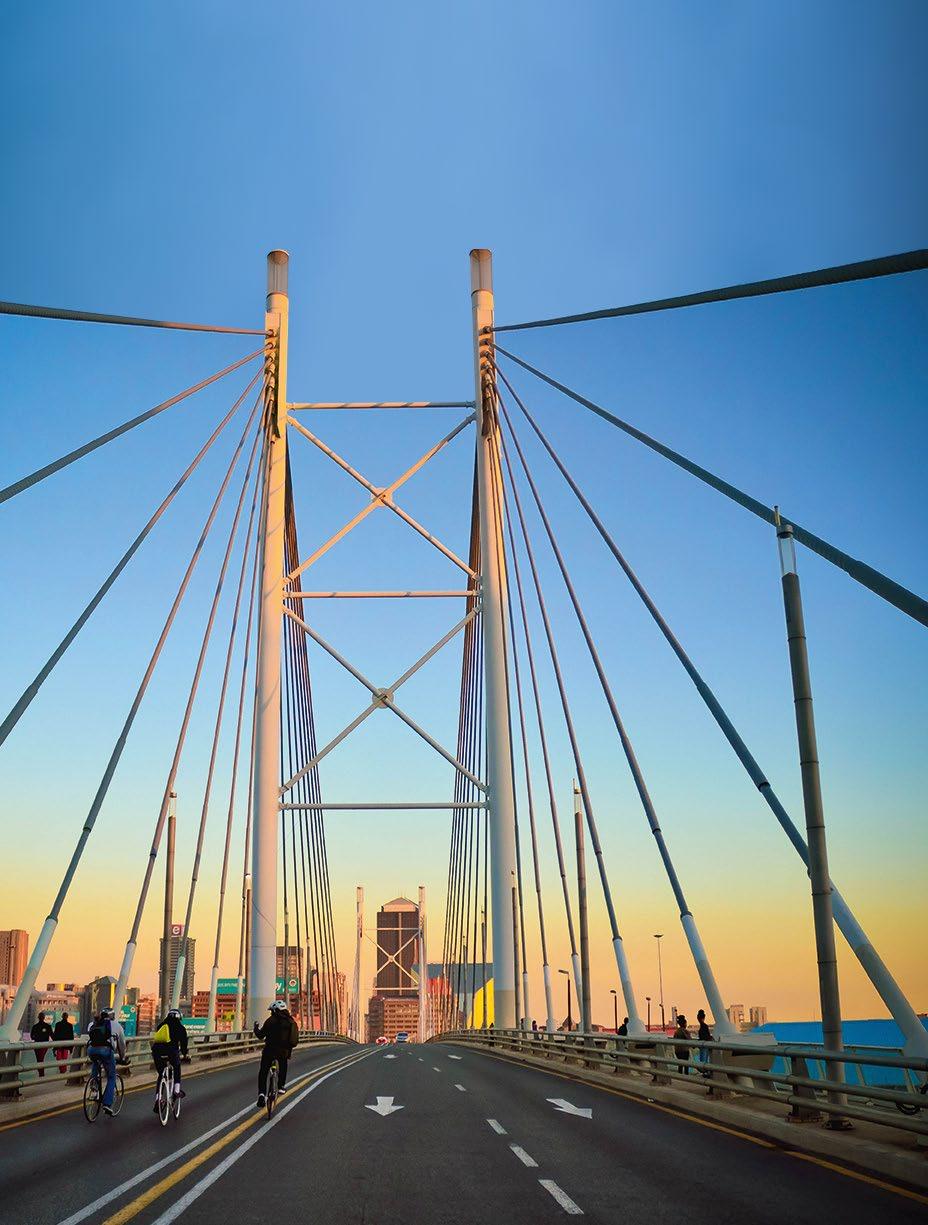
NOVEMBER/DECEMBER 2021 • Issue 98 FAME WEEK AFRICA An event showcase like no other 2022 VARIANTS AND VACCINES Focus on trends for the year ahead The road ahead PAVING THE WAY FORWARD FOR THE RECOVERY OF THE BUSINESS EVENTS INDUSTRY South Africa National Convention Bureau’s Open Door Strategy R55.00 (incl. VAT) ISSN 1684-9264

OPEN FOR SMALL MEETINGS #BringIt2CTICC Offer valid until 31 Dec. 2021 sales@cticc.co.za +27 (0) 21 410 5000 BOARD MEETINGS | STRATEGY & BRAINSTORMING SESSIONS | TRAINING AND WORKSHOPS VENUE WITH BOARDROOM TABLE AND CHAIRS TWO-COURSE CHEF’S CHOICE LUNCH SECURE PARKING R400 (including VAT) per delegate Max of 20 delegates INCLUDING: #VersatileVenues Ts & Cs apply SETTING THE SCENE FOR GROWTH AND EXPANSION CLICK HERE TO FIND OUT MORE
Meetings speaks with the South African National Convention Bureau’s very own Amanda Kotze-Nhlapo, who unpacks the Bureau’s strategy paving the way for the recovery of the business events sector.
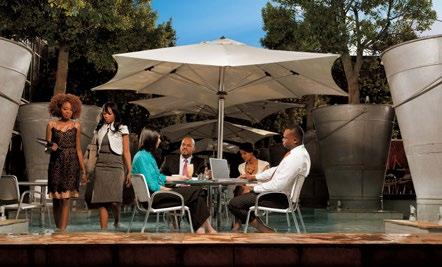
06 FOCUS: TRENDS 2022





We operate our businesses and go about our professional lives hoping to align our ways of working to a trend that will stick – but the days of certainty are long gone. Meetings peers into the crystal ball to try identify what we can expect in 2022. 09

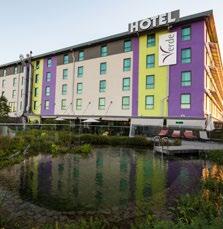
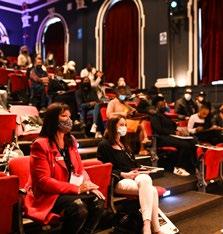
09 14 CONTENTS 23 NOVEMBER/DECEMBER 2021 04 The Planner is
footprint –
with us today! @theplannerguru The Planner @theplannerguru the-planner-guru
growing its
connect
04 COVER STORY: OPEN DOORS
VENUE
Hotel Verde Cape Town Airport
MEETING PLACES New Age Spaces
BEST PRACTICE Content 14 BEST PRACTICE Planning + Budgeting 17 INNOVATION Why Challenges Work 18 BUSINESS TRAVEL ETIQUETTE 20 HEALTH + SAFETY Covid-19 Protocols 22 EVENT SHOWCASE FAME Week Africa 24 Q+A Entertainment REGULARS 02 Ed’s Comment 03 Tidbits 32 Miss Meet TALKING POINTS 28 SAEC 29 AIPC 30 AAXO + EGF 31 SAACI + SACIA 26 12
SHOWCASE
10
12
LET US CONTINUE TO WEATHER THE STORM, TOGETHER

Not one of us is where we are today because we did it all on our own, I believe. This is a clear trend we are seeing among our industry; through our collaborations and the strength of our networks, we can deliver effective and impactful solutions to our clients. On page 06, we offer some insights into the trends we believe will define the business events industry in 2022.
On page 18, Oz Desai, GM of Corporate Traveller, provides a practical take on business travel in a pandemic era. What we are seeing is that those who are travelling for business are quite nervous to do so, particularly if the individual in question is taking a trip for the first time since the start of the pandemic.
BUILDING CONFIDENCE
Building confidence is a huge factor in the recovery of the business events industry and MICE experiences as a collective. A means to economic recovery overall is ensuring a type of herd immunity as quickly as possible, with vaccines being key in this. We hear

from a range of industry experts on page 20 on why relaxed numbers don’t mean relaxed protocols. This is more important now with the recent announcement of a new variant, Omicron. The detection of the variant in South Africa has resulted in some countries implementing travel bans for several nations within the Southern African region. We report on this on page 26.
Variants and vaccines aside, on page 14 of this issue of Meetings , we understand how best to plan and budget for each of our events. We provide links to the latest resources and tips to help you, our fellow organisers, in bringing together the most exceptional events and experiences for your delegates. Together with our content feature on page 12, you can confidently organise any event that follows all protocols and comes in under budget while meeting your objectives. Lastly, as we come into 2022, I would like to thank my team for another year under the belt. I could not have stayed the course without your support, and it has been an honour to be part of something as special as our cohesive unit. Wishing everyone a wonderful, restful and safe festive break – I hope to see you all refreshed and revitalised in the New Year!
Managing Editor Shanna Jacobsen (shanna@3smedia.co.za)

Chief Sub-Editor Tristan Snijders
Head of Design Beren Bauermeister
Contributors Mark Anderson, Sven Bossu, Glenton de Kock, Kevan Jones, Scott Langley, Greg McManus, Nomaswazi Tinus
Production & Client Liaison Manager




Antois-Leigh Nepgen
Group Sales Manager Chilomia Van Wijk
Bookkeeper Tonya Hebenton
Distribution Manager Nomsa Masina
Distribution Coordinator Asha Pursotham
Advertising Vanessa De Waal +27 (0)84 805 6752 | Vanessa.DeWaal@3smedia.co.za
PUBLISHED BY
Publisher Jacques Breytenbach
3S Media
Production Park, 83 Heidelberg Road, City Deep, Johannesburg South, 2136
Tel: +27 (0)11 233 2600 Fax: +27 (0)11 234 7274/5
www.3smedia.co.za
Meetings NOVEMBER/DECEMBER 2021 © Copyright

All rights reserved 2021 www.theplanner.guru
SUBSCRIPTION
R330.00 per annum (incl. VAT) | subs@3smedia.co.za


ISSN 1684-9264
NOTICE OF RIGHTS Meetings is published bi-monthly by 3S Media. This publication, its form and contents vest in 3S Media. All rights reserved. No part of this book, including cover and interior designs, may be reproduced or transmitted in any form or by any means, electronic or mechanical, including photocopying, recording or by any information storage and retrieval system, without permission in writing from the publisher, nor be otherwise circulated in any form of binding or cover other than that in which it is published and without a similar condition being imposed on the subsequent purchaser. The authors' views may not necessarily reflect those of the publisher or associated professional bodies. While every precaution has been taken in the preparation and compilation of this publication, the publisher assumes no responsibility for errors, omissions, completeness or accuracy of its contents, or for damages resulting from the use of the information contained herein. While every effort has been taken to ensure that no copyright or copyright issues is/are infringed, 3S Media, its directors, publisher, officers and employees cannot be held responsible and consequently disclaim any liability for any loss, liability damage, direct or consequential of whatsoever nature and howsoever arising.
MEMBER OF IN COLLABORATION WITH
Shanna
The ABC logo is a valued stamp of measurement and trust, providing accurate and comparable circulation figures that protect the way advertising is traded.
Meetings is ABC audited and certified.

ED’S COMMENT
After almost two years in lockdown, we have not arrived at this point on our own steam. With this in mind, we need to ensure that our efforts in our recovery are focused and unified.
The White House announces US-Africa Leaders Summit for 2022


According to a statement by The White House made in November, President Joe Biden will host the Second US-Africa Leaders Summit with several heads of state and members of government from across the African continent next year. “This Summit will continue efforts to strengthen ties with African partners based on principles of mutual respect and shared interests and values. It will also serve as an opportunity to listen to and collaborate with African counterparts on key areas the United States and Africa define as critical for the future of the continent and our global community,” The White House stated in its communication, adding that more details will follow in due course.
Meetings’ must-know minutiae
Ghana Tourism Authority drives nation’s MICE development

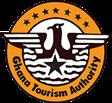
EIC launches CMPs Fellows Programme
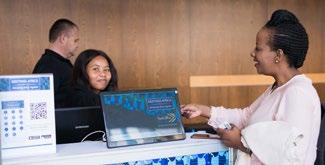


The Events Industry Council (EIC) – an industry body dedicated to the advocacy, research, professional recognition and standards of business events – has launched its CMPs Fellows Programme. The programme seeks to recognise and reward Certified Meetings Professionals who continue to contribute toward the betterment of the events community. Fellowship is open to individuals who have been CMPs for at least 10 years or emeriti who can provide evidence of their experience within the events industry. Applications for next year close on 31 January 2022.
The Ghana Tourism Authority announced in early November that it will be prioritising infrastructure within the country to position it as a MICE hub within West Africa. Currently, Ghana lacks sufficient facilities for larger capacities; however, with figures from numerous sources indicating that the value of the MICE market is well over a trillion dollars, this is seen as a major and growing economic opportunity for both the country and region.
Local industry trade shows make a comeback
Following the cancellation of two of our industry’s most prominent events due to the Covid-19 pandemic, an exciting announcement was recently made that Meetings Africa and Africa’s Travel Indaba will return in 2022. Meetings Africa will take place from 28 February to 2 March next year at the Sandton Convention Centre in Johannesburg, while Africa’s Travel Indaba will be hosted from 2 to 5 May 2022 at the Inkosi Albert Luthuli International Convention Centre in Durban. Both events will also offer virtual attendance. Read our cover story on page 04 for more about this.
Ora channels $1 billion into African expansion
Ora Developers, an Egyptianheadquartered property developer, has revealed plans to invest US$1 billion (R16.15 billion) in growing its presence in Africa. Ora Developers made the announcement during the Cityscape Global trade show held in Dubai in mid-November. CEO Naguib Sawiris says that the company will be developing a number of resorts in several African markets.
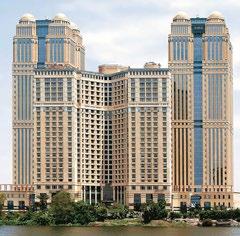
Ora Developers has also indicated that it is considering investment opportunities within Ghana and the DRC.
Meanwhile, back home in Egypt, Ora is currently developing three sizeable mixed-use projects with a combined value of around $10 billion.
www.theplanner.guru MEETINGS l NOVEMBER/DECEMBER 2021 • 3
OPEN DOORS
Business events play a critical role in the economy. According to figures from the Events Industry Council, cited by South African Tourism, in 2016, the global MICE (meetings, incentives, conferences and exhibitions) and business events industry generated around US$1.5 trillion (R23.5 trillion today) in direct spend. The Covid-19 pandemic may have resulted in a slew of cancellations but before 2017, the industry contributed $7.7 billion (R120.9 billion today) to South Africa’s GDP – a third of the total amount generated by tourism, of which business events
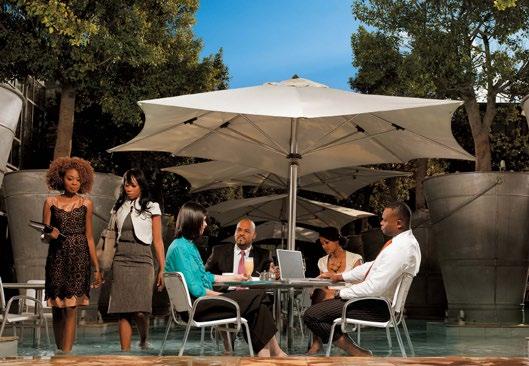
is a subsector. These figures highlight the value of business events as well as why the subsector should receive the right level of attention to realise its full economic potential.
Attracting and supporting bids for locally hosted business events forms part of the mandate of the South Africa National Convention Bureau (SANCB) –the business events arm of South African Tourism – with the recovery of the industry in the wake of the pandemic being a key objective. With the pandemic still ongoing, the total economic impact on business events is yet to be calculated;
however, figures from a survey conducted by the Southern African Association for the Conference Industry (SAACI) in March 2020, which involved 167 respondents across all nine provinces in South Africa and included the spectrum of events-related organisations, indicated that $49.8 million (R782 million) in revenue was lost due to cancellations between March and June 2020 alone. The recovery of the industry, highlights Amanda, chief convention bureau officer at the SANCB, will first be felt domestically.

“Looking at the recovery of face-to-face meetings, you will immediately attract your local partners, then affiliates from outside the region and, lastly, international travellers. We are seeing this all over the world, but the first step is building the confidence among ourselves,” she says.
WORKING AROUND THE CHALLENGES
A major hurdle in the face of adjusted lockdown restrictions is ensuring MICE experiences can successfully go ahead and do so safely.
“The lead time for us to plan events has been challenging. Africa’s Travel and Tourism Summit

COVER STORY
Meetings spoke with the South Africa National Convention Bureau’s very own Amanda Kotze-Nhlapo , who unpacks the Bureau’s strategy that paves the way for the recovery of the business events sector.
Amanda Kotze-Nhlapo, chief convention bureau officer at the SANCB
(ATTS) is a good example of this. We had to work with a maximum in-person attendance of 50 people, which, thankfully, changed but also shows how we have had to learn to adapt,” explains Amanda.
ATTS was co-hosted by the National Department of Tourism and South African Tourism. On 12 September 2021, days before the summit kicked off, President Cyril Ramaphosa announced that South Africa would move to Alert Level 2 restrictions of its lockdown, in place to manage and mitigate the risks of the Covid-19 pandemic. Weeks later, an announcement was made that the number of people permitted at social gatherings would be increased to 750 people for indoor and 2 000 people for outdoor events – the largest capacities allowed since lockdown began on 26 March 2020.
In addition to safeguarding existing event opportunities, the SANCB has a broader strategy in play to promote the growth and development of
LOOKING AHEAD: THE SANCB’S NATIONAL ASSOCIATION PROJECT
It is clear the Covid-19 pandemic will permanently alter the business events landscape. To counter the adverse economic effects of the pandemic, the SANCB has designed an innovative programme that takes into account its existing and long-term objectives, and marries these with a strategy that will assist the business events sector in its recovery.
One initiative intended to support these objectives is the SANC B’s National Association Project, which aims to stimulate demand for national conferences and secure a pipeline of future business for the country. This is in line with South African Tourism’s recovery plans for the entirety of the tourism industry value chain.
National associations have been identified as critical stakeholders in the bidding process to secure international conferences within South Africa, and the National Association Project is intended to capacitate and stimulate the local association sector in order to start hosting regular national meetings again, while creating bidding opportunities for international conferences in the future.
Specific objectives of the National Association Project include:
• Creating a regional spread: This will see the SANCB assisting national associations in hosting their meetings and conferences in villages, towns and small dorpies (VTSDs) across South Africa.
• Bidding capacity-building: The SANCB has created bidding support programmes and processes specifically for national association meetings and conferences.
• Infrastructure development: The SANCB is assisting VTSDs across the country to develop their meeting and conferencing infrastructure so they can bid to host national association meetings and conferences.
• Pre- and post-event tours: This strategy is receiving particular emphasis as it seeks to promote tourism experiences, specifically pre- and post-tour packages for delegates and any accompanying people in VTSDs. These can then be marketed to delegates by local SMMEs, thus contributing to domestic tourism.


• Procurement: The SANCB is incentivising the procurement of goods and services by local service providers in VTSDs.
• Association capacity-building: This will result in the creation of opportunities for VTSD communities to participate in and experience national association meetings and conferences as delegates.
an inclusive and thus sustainable business events sector (see box above).
IT ALL STARTS WITH A MEETING
While the recovery of the industry may still be under way, the future of the industry in South Africa is looking promising.
Most recently, it was announced that –following the cancellation of two of its most prominent trade shows as a result of the Covid-19 pandemic – both Meetings Africa and Africa’s Travel Indaba will be going ahead in 2022.
Meetings Africa will take place from 28 February to 2 March 2022 at the Sandton Convention Centre, in central Gauteng, while Africa’s Travel Indaba will be hosted from 2 to 5 May 2022 at the Inkosi Albert Luthuli International Convention Centre in Durban, KwaZulu-Natal. Both will be hybrid events with limited capacities.
Together, the two events will serve as a showcase to exhibitors, hosted buyers, as well as local, African and international delegates that South Africa is open for business.
Giving a message to all venues, suppliers and role players who form part of the business events value chain, Amanda has this to say: “Embrace the change. More than ever, we need to make sure that we work together. Our projections for 2030 have not changed, and how we come together will define the way forward.”
#SANCB
convention@southafrica.net +27 (0)11 895 3000 www.businessevents.southafrica.net
SouthAfricaNationalConventionBureau SA_NCB south-africa-national-conventions-bureau meetsouthafrica SouthAfricanTourism
21
FOR 2022
We operate our businesses and go about our professional lives hoping to align our ways of working to a trend that will stick – but the days of certainty are long gone. Meetings peers into the crystal ball to try identify what we can expect in 2022.

01
ACCESS TO (CREDIBLE) INFORMATION
Having solid information resources will enable us to make the best decisions for our businesses and communities.
HOME, SWEET HOME
Domestic meeting and travel experiences will need to receive priority to stimulate industries such as MICE.
03
SWIFT DECISIONMAKING
Acting swiftly and implementing the correct measures to mitigate the spread of Covid-19 will continue to ensure the health and safety of everyone we come into contact with.
02 05 08
HYBRID EVENTS MAY BE PERMANENT…
Technology has not only supported how we meet but also how we go about our day-to-day lives and stay connected. This will be no different in 2022.
VACCINES
Vaccines will be placed front and centre of both local and international economic recovery.
04
TURBULENT INDUSTRY
Industries directly impacted by the Covid-19 pandemic – such as travel, tourism and hospitality – will continue to experience uncertainty and instability until global herd immunity is achieved.
06 09
FLEXIBILITY AND ADAPTABILITY
We will need to build in greater flexibility to ensure we can easily adapt our events to rapidly changing situations as they arise.
AS WILL SMALLER, INTIMATE EVENTS
The smaller the better… for now. Hosting smaller meetings and events is safer until the same risks are no longer present, although this does not have a clearly defined timeline.
07 10
ALIGNED VALUES
The reasons for getting our attendees into one room must align with strong core values and principles.
BITE-SIZED CONTENT
Avoid overcommunicating to your attendees and audience by inundating them with excessive amounts of information.
6 • MEETINGS l NOVEMBER/DECEMBER 2021 www.theplanner.guru FOCUS
COLLABORATION
Ongoing collaboration between parties with similar objectives will ensure that the collective can survive.
14
MEMORABLE MICRO-MOMENTS
Creating powerful, impactful moments will continue to be a strategy to ensure your events are memorable experiences for your attendees.
17
DIVERSITY AND INCLUSION
11 18
An inclusive industry is a successful industry. More and more, it is being recognised that industries across the board need to be inclusive.
MORE DESTINATIONS
The MICE industry has previously not received the necessary support to grow and develop itself; however, more countries are recognising this as a means to promote their offering as a destination.
NETWORKS

Business networks will be key. In this day and age, we cannot afford to be on the periphery of important developments and will need to be in the know.
13
CLEARLY COMMUNICATED PURPOSE
15
PERSONALISATION MATTERS
Make sure your delegates know they are more than just a field on a database and push personalisation as far as possible.
SUSTAINABILITY
The recent launch of the Net Zero Carbon Events pledge highlights the ongoing efforts by the events industry to ensure it is sustainable.
16
COMFORT IS KEY
Make sure your attendees feel relaxed and comfortable by ensuring they have, at the least, access to basics such as food and snacks, a nice place to sit, and a quiet place to break away if need be.
19
12 21
INDUSTRY PROFESSIONALISATION
Professional designations within the MICE and business events industry will receive greater recognition as playing a key role in how these experiences come together.

GAUGING ENGAGEMENT

The purpose of what we communicate must be made clear, with this message forming a common thread throughout everything we do. 20
With the support of technology, we can more closely gauge the engagement of our audiences; it is hugely important to our clients and sponsors to substantiate ROI and secure repeat business.

www.theplanner.guru MEETINGS l NOVEMBER/DECEMBER 2021 • 7 #TRENDS2022
+27 (0)11 233 2600

















































































subs@3smedia.co.za theplanner.guru

















theplanner.guru is a one-stop platform for finding venues and suppliers. It’s where you can read the hottest industry tips and trends as well as source event planning tools and gain insight from valuable information in the MICE Hub. Plan your event by using the platform’s event boards and keep up-to-date with the daily newsletters. Use these resources to take your events from great to flawless.
Packed with advice, handy tips, tools, checklists and event planning insight from leading industry experts and combined with the comprehensive listings, The Meetings & Event Planner is essential if you’re organising any type of event. Published annually.

Looking for new and exciting destinations?

The Incentive Planner is jam-packed with fresh ideas and top tips to turn any incentive trip into a memorable experience. Out in March and September with Meetings.
Incentive ideas





The Exhibition Planner is an essential tool for exhibitors. Information is packaged in an easily digestible format addressing the entire process of planning and arranging a show stand, what to do pre-show, during and post-show. Published annually.
This alternative monthly publication investigates new trends, ideas and strategies relevant to the meetings and events industry to keep you ahead of the planner pack. Meetings provides a platform for branding and promoting venues and service providers to the heart of the South African conferencing and event industries.
3S Media gives YOU the competitive edge as a MICE planner



@theplannerguru The Planner @theplannerguru
INCENTIVE www.theplanner.guru
VOTE
of confidence
Hotel Verde Cape Town Airport was recently named the Best Luxury Airport Hotel in Africa at the World Luxury Awards – we see what makes it stand out from the rest.
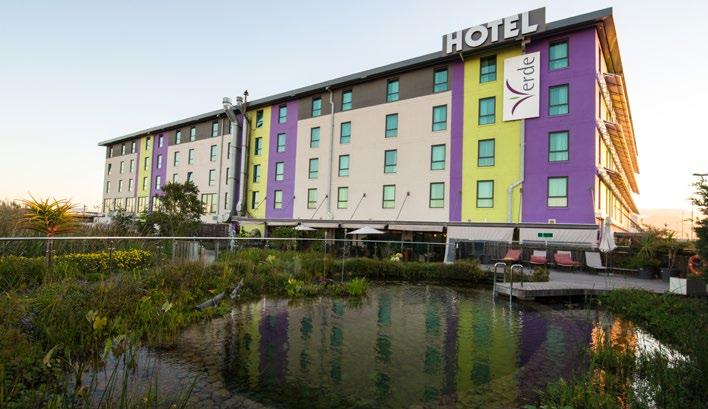
It is with great pride and excitement that stakeholders and staff at the Hotel Verde Cape Town Airport were recognised as the Best Luxury Airport Hotel in Africa during the World Luxury Awards gala ceremony.

“This award serves as recognition of sustained commitment to excellence in hoteliering and outstanding achievement in the international luxury hospitality industry. The World Luxury Hotel Awards hereby certifies the wonderful achievement of Hotel Verde Cape Town Airport in the 2021 awards and congratulates them on this accomplishment,” says Brandon Lourens, founder and CEO of the World Luxury Hotel Awards.
The World Luxury Awards, which have been presented annually since 2006, seek to provide recognition for establishments that do their countries and continents proud by providing world-class service excellence. These sought-after

accolades are presented on a country, regional, continent, and global basis, and winners are determined based largely on public vote via an exclusive online platform. This year’s awards were hosted by the Trou aux Biches Beachcomber Golf Resort & Spa in Mauritius on 9 October 2021.
WHAT IT TAKES TO BE AN AWARDWINNING VENUE
According to Jana Stoman, execut ive manager of the World Luxury Awards, there are many factors that play a role in what makes a top contender.
“Aside from the public vote, we also take other criteria – such as brand, location and overall guest satisfaction based on online reviews – into account,” she explains.
The Hotel Verde Cape Town Airport management team would like to dedicate this
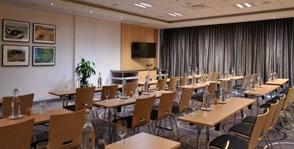
award to every person who forms a part of its valued team.
“We know full well that the feeling and notion of luxury is something that is not attained easily. It is only with the support of our efficient and dedicated staff members that we are able to create a space in which every guest feels valued from the moment they walk through our doors until they leave to travel onward,” says Caron van Rooyen, GM at Hotel Verde Cape Town Airport.
“Our team members are always willing to go above and beyond the call of duty to ensure that every challenge is resolved and that each guest experience is of impeccable quality,” she concludes.
www.verdehotels.com

www.theplanner.guru MEETINGS l NOVEMBER/DECEMBER 2021 • 9
VENUE SHOWCASE: HOTEL VERDE CAPE TOWN AIRPORT
RIGHT PLACE RIGHT TIME,
A meeting or event venue plays a major factor in an attendee’s experience, which is why choosing the right space is so important. Meetings presents some exciting options you may want to consider.
Lacking hygiene protocols. Difficult to access. Poor service. Bad food. No parking.
If your delegates have this sort of feedback on your event venue, it may completely overshadow how informative, interactive or innovative your event is. With venue hire forming a major chunk of the costs associated with producing your event, don’t settle for what appears to be within budget without understanding what you’re in for.
SCOUT OUT YOUR VENUE
There is a reason that many event organisers choose to have meetings and events at the same venue each year – they are comfortable and familiar with the space and, by the second year, they would have built a good relationship with the venue’s management team.
Unless you have hosted an event at a particular venue in the past, research this extensively; do as many site visits as it takes to understand the space you are working with, inside out. Speak to other event organisers who may have used the venue in the past on their experience working with the management team. Word-of-mouth recommendations from your peers are most likely to provide you with the right information you need to decide on
your venue. Weigh up any negative reviews and whether these were a once-off incident or whether they might be a factor in how your event takes shape.
VENUE AND INFORMATION ACCESSIBILITY ARE A BIG DEAL
Making sure your venue is as central as you can manage it – for wherever the majority of your delegates are coming from – and that there is enough parking, or a drop-off zone close enough to the entrance is key. Getting lost or confused on where to go does not set the right tone for your attendees; signposting and clear directions with this information are often overlooked.
Liaise with your venue on ensuring attendees can easily find their way in, out and around your venue, and try to provide as much of these details ahead of your event – either on your event app or in an informative email that goes to your attendees. If you have enough resources and a large enough budget, appoint staff on the ground to help chaperone delegates around the venue.
All else failing, have a number for attendees to call where they can be assisted with this sort of information. As we have seen during the Covid-19 pandemic, information goes a long
way to providing the right level of reassurance to delegates, so take care to ensure your communication and instructions are clear and easy to understand.
PROTOCOLS ARE AN EVEN BIGGER DEAL
Health, safety and hygiene protocols simply cannot be ignored. Currently, in South Africa, events taking place need to be capped at 750 people indoors and 2 000 people outdoors. Together with the mandatory wearing of masks and adherence to physical distancing of at least 1.5 m, these protocols, among others, are intended to significantly minimise the risk of infection.
“The first crucial consideration when deciding on potential venues is health and safety. Given the emergence of the Covid-19 Delta and now Omicron variants, which are significantly more contagious than previous iterations, event planners must stay especially vigilant to avert potential outbreaks at the event venue. Therefore, you have to ensure that the venue you choose follows local health and safety guidelines. That is not only in theory, but the venue should have written safety protocols and policies to minimise the risk of Covid-19 infection,” writes InEvent, an events software company.
Another consideration is to explore venues with outdoor spaces, as the risk of spreading infection is significantly reduced, although inclement weather may be a factor, so negotiate flexibility with your venue.
As a final measure, InEvent recommends that if your venue of choice is indoors, ask if their ventilation system includes air purifiers that eliminate the presence of Covid-19.
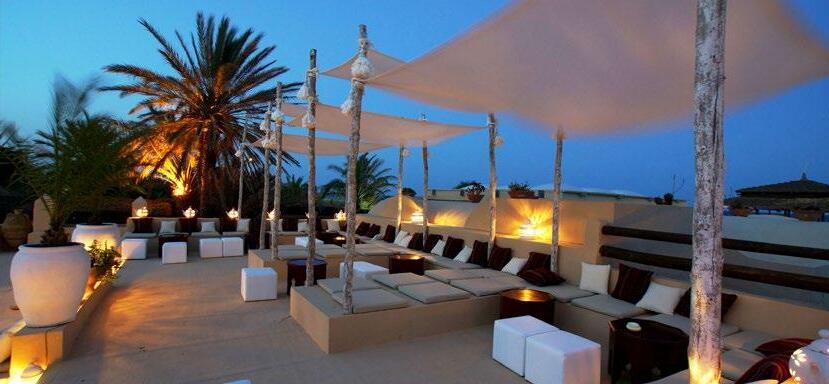
10 • MEETINGS l NOVEMBER/DECEMBER 2021 www.theplanner.guru
MEETING PLACES
TIPS FROM THE PROS
Finding the perfect venue can be a challenge. A venue receives an enormous amount of focus from event organisers because it can be a key deciding factor in an attendee’s participation. This is nothing new; however, Covid-19 has impacted how events are run, and your venue also now needs to safeguard your delegates.
Here are some of Cvent’s top tips to consider when selecting your venue:
1 4
INCREDIBLE SERVICE CHANGES THE GAME
There’s something to be said about the venues that really know what they’re doing. Attention to detail and observant staff can be a game changer. Attendees want to be treated like VIPs. Find venues that will cater to the VIP experience and help you provide everything attendees could want – and more. As a result, your venue will add to the attendee experience.
TECHNOLOGYFOCUSED VENUES
Venues are doing amazing things with technology. From robots to automation, tech can spice up a venue. Technology can help create engagement and creative spaces. As always, make sure that the venue has strong Wi-Fi – your attendees will notice if it doesn’t! Finally, make sure there is someone on-site from the venue to help if the technology in the space malfunctions.
2 5
CHOOSE A VENUE THAT MATCHES COMPANY IDEALS


If your organisation is focused on sustainability, choose a venue that embodies those ideals. Focus on health and wellness, then pick a venue that can accommodate workouts, massages and more. Above all, the venue should reinforce the purpose of the event.
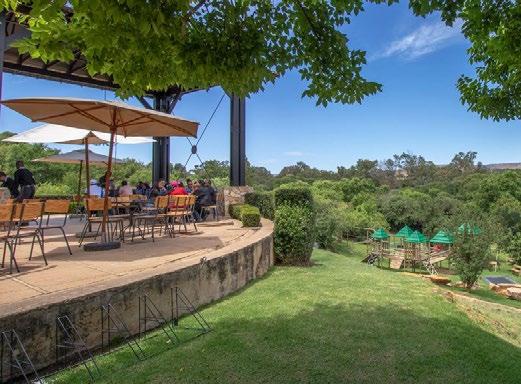
PERSONALISATION MATTERS
Some venues are blank palettes and some need to be dressed up. Planners have created incredible spaces out of blank canvases. Brand and personalise a blank space to appeal to attendees. Industrial spaces offer a raw backdrop that can be dressed up or down. Above all, they give you a chance to create something unique from scratch.
3 6
VIRTUAL EVENTS
While face-to-face events are irreplaceable, virtual events can fill a void when attendees aren’t able to travel far or have a limited budget. From virtual-reality options to live-streaming, think about hosting your event online. As a result, you’ll be able to increase the number of attendees by catering to their needs.
EMBRACE ALTERNATIVE SPACES
Venues aren’t limited to hotel ballrooms and convention centres. Rather, they can happen anywhere. Bars, theatres, wineries and more can host events that inspire – there are always new spaces to explore. Push past the expected and look for venues that offer a little something extra. Attendees are looking to attend events at venues that are cool and Insta-worthy. Look for spaces that are off the beaten path or a little quirky to add a cool element to your event. Additionally, keep in mind attendee demographics when picking a space.

www.theplanner.guru MEETINGS l NOVEMBER/DECEMBER 2021 • 11 #NEWAGESPACES
BRINGING YOUR EVENT TO LIFE
Attending an event where you felt as if the information could be sourced on Google is the opposite of what any event organiser wants to achieve. Rehashed or different iterations of content is no better, so outlining a solid content strategy that achieves your desired objectives is key for any organiser and sponsor.
CREATING A CONTENT ECOSYSTEM
Content needs to be thought of in a much broader sense than just speakers and presentations. In order to create that soughtafter flow every organiser hopes to achieve at their event, consider your content as an ecosystem in which each element impacts the other to create a dynamic experience for your audience.
“Content is no longer a marketing tactic; it’s brand currency,” says Skyword, a US-based

marketing specialist. They support the idea of a ‘Content Ecosystem Model’ in “collectively building market momentum and supporting the purchasing journey at scale.” In very simplistic terms, this is achieved by arranging content into a strategic network of assets to drive greater effectiveness of marketing efforts.
This means that any and all content – from your speaker line-up to your RSVP management systems – must have a common thread that ensures the correlation between all of these elements is clear to anyone on the receiving end.
UTILISATION OF ASSETS
“If content is king, then distribution is King Kong.” This is a phrase we have often heard in the media and marketing space – more so in the last 10 years than ever before. This won’t go away in a
hurry either – if you want your message to be heard, it requires a channel to be broadcast.
Digital media – and especially social media – is on the rise and growing at an alarming rate. To illustrate this, Statista figures indicate that, on average, the world spends 7.5 hours per day consuming and interacting with all media. From this, digital media forms more than 99% of media consumption, which includes social media, with the numbers here indicating dizzying growth.
In a separate report by Data Portal, it is noted that the number of social media users is comprised of 70% of the global population who are eligible – i.e. at least 13 years old.
“Social media user numbers have seen strong growth over the past 12 months too, with 409 million new users joining social media in the year to October 2021,” notes Data Portal in its October 2021 stats.

With the uptake of social media in the past year equating to an average of 13 new users every second, the pervasive power of these platforms cannot be ignored as forming a crucial part of your content ecosystem.
DEVELOPING A STRUCTURED APPROACH
Without a structured approach, you are at an immediate disadvantage, so taking the time to understand what will make your event stand out from the rest will make the difference between this being a roaring success and a complete and utter flop.
Before you start planning, ask yourself a few questions. Are your outcomes clearly defined? Do you want to raise awareness around a specific product or a service, or do you want to make money from subscriptions or ticket sales?
Working backwards from these goals will help you find the means to achieving them – but take care to avoid a blanket approach in how you communicate and engage with your audience, whose media consumption habits and how they absorb information are not likely to be the same. This is where having a multipronged, omnichannel strategy will ensure that your message is seen at the right time, in the right place and by the right people.
Additionally, timing will play a role in where and how your content goes out. Organisers may not want to give away too much information on what is happening ahead of the event but
www.theplanner.guru GOLFING BEST PRACTICE
Content might seem like an easy element to work into an event but there is a science behind it that can make or break your meeting or conference experience. Meetings explains.
just enough to secure the attendance of potential delegates.
ENGAGEMENT AND FEEDBACK
How do we know whether our message has been seen and our audience is responding in the right way?
If we as event organisers have done our job right and successfully delivered our content to a receptive audience, this should be seen almost immediately. Our calls to action will be fulfilled and hopefully we can see a sharp uptick in demand, with people reaching out to us to either sign up to our product or service or to find out more information.
If this is unfortunately not the case, you need to establish why your message did not land sufficiently or have the desired and intended impact. Surveys may be able to offer some insights into what your audience did and didn’t enjoy from their experience. Participants can be incentivised so that you can drive responses and draw conclusions based on holistic feedback.
If you are working with a team, hearing their views may also provide perspective on where your event was perhaps lacking or overdone. Without understanding this, it will be quite challenging to make any improvements on your events going forward.
AVERAGE MEDIA CONSUMPTION

473 MINS
Daily time spent with media worldwide
12
Number of paid media subscriptions
470 MINS
Time spent per day with digital media
ENGAGING ACTIVE BUYERS WITH CONTENT THEY WANT

A case study on how content and learning preference impact buying teams and your ability to engage them.
According to a leading study of learning styles, about 20% would read the manual, 40% would watch a video and 40% would Zoom. You might say that “it depends on what I’m trying to buy/learn”, which is true enough. Approximately two-thirds of us are multimodal learners. We rely on multiple info formats and our preferences shift depending on what we’re trying to understand or buy.
The point is that we all default to a learning style, or styles

And those deeply ingrained preferences guide not just our
consumer-oriented decisions but how we acquire knowledge and make decisions in our business life, too. The same can be said for the enterprise tech buyers we market and sell to. Learning preferences don’t change just because you’re buying cloud backup or network management versus a stationary bike.
This is an excerpt from an article that originally appeared on BrightTALK on 28 April 2021. To access the full piece, click here.
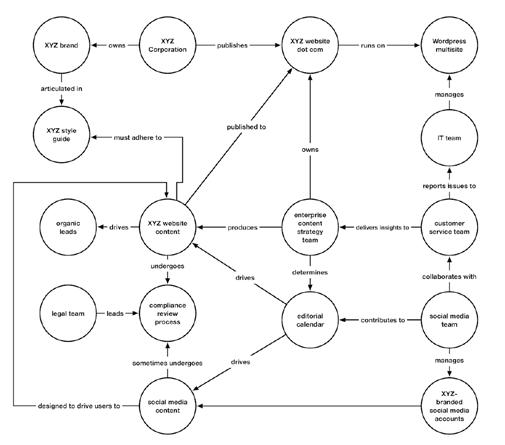
www.theplanner.guru MEETINGS l NOVEMBER/DECEMBER 2021 • 13
#CONTENT
Creating a content ecosystem map, according to Brain Traffic
Conference and event organisers are constantly finding new and innovative ways in which to work. Meetings understands how the Covid-19 pandemic has changed planning and budgeting, providing some tips and tools you may want to consider.


TURNING ON A DIME
Everything we do as planners and organisers is centred on both time and money. It is for this reason that planning and budgeting for an event should go hand in hand.

The fact is that when it comes to planning an event, there is less time and even less money than prior to the start of the Covid-19 pandemic, so we need to act prudently with the precious resources we have available to us.
BUDGET BONUS
From an event organiser’s perspective, events come about based on demand that is either identified on the part of the organiser, or a client who may also be the headline sponsor.
With timelines and budgets for producing events significantly reduced, this immediately
impacts on sponsorship because it takes time to build relationships with potential sponsors who also need enough time to mull over proposals and make decisions.
In an age where cash flow is so incredibly constrained, having any budget at all is like manna from heaven.
Producing an event on behalf of a sponsor or client may need to happen on a very tight turnaround. This has been evidenced more so in lockdown, with the rapidly changing landscape meaning that planning for certain numbers can be affected by a single announcement. In South Africa, this usually starts with “My fellow South Africans”, as President Cyril Ramaphosa takes to the podium to address the nation. What this has resulted in is a ‘carpe diem’ mentality, where time is of the absolute essence; however, are
FOCUS BEST PRACTICE
there other means we can deploy to militate against the major shifts that affect us?
Enter the evolution of the event planner…
PERMANENTLY ALTERED?
As much as industries like the adversely impacted business events sector yearn to work in the same way as they did before, it is unlikely that this will be the case. Flock Eventing Platform gives us a reality check on where we are.
We’re not historians, but we like to think that social events have existed for as long as society itself has. We’re sure there are many examples of event planners in history, but a particularly notable one is Cleopatra. It’s said that every event of hers had a purpose, whether it be finding potential suitors or discussing matters of state with other politicians.
Organising these events wasn’t easy –sending out invitations alone took weeks, or months, as they were hand-delivered. That said, Cleopatra had access to an inordinate amount of free labour, which would have sped up the process.
1 Event planning today
These days, it feels like event planners have fewer parties to liaise with and longer DIY to-do lists to get the job done –especially for online events.
In fact, many organisers who have adapted their skill set for online functions no longer call themselves event planners. The new, updated description is digital event manager (DEM). DEMs still have the duties of the classic planner – liaising, organising and logistics – with the added tasks of a digital marketer.

Let’s take a look at how some aspects of event planning have changed over time, and how organisers have adapted.
2 The invitation
As we mentioned above, invitations were hand-delivered back in the day. This then evolved into snail mail, then email and, now, social media.
Previously, event organisers would contact a stationery supplier, get the invitations designed and printed by professionals, and send them off in the mail. A modern-day DEM, on the other hand, might design and build the emailer themselves. Even if the design is outsourced, they’re still familiar with platforms like Mailchimp and know how to manage them.
The same goes for social media. Both LinkedIn and Facebook have tools to
advertise events, which planners need to take full advantage of.
3 The venue
Online events have, of course, become extremely popular, which means event planners today are much more tech-savvy than they’ve ever needed to be. Planners have to consider all aspects of the audio and visual experience. What kind of background should the speakers have? Should there be music? How do we incorporate branding into this?
Technology has made answering these questions all too easy. There’s no need to spend money on web hosting, designers and developers, when DEMs can use tools to host online events and webinars with ease. To stay competitive, event planners need to have these tools in their arsenal.
4 Data management
The way we collect data has also changed, thanks to technology. As such, clients expect to see more than the number of attendees in your report of the success of the event. They want to see guest engagement, brand awareness, sales, web traffic, return on investment – the whole nine yards.
Measuring the ROI from virtual events can be challenging, but luckily there are tools out there that make this easy for digital event planners. You just need to know how to use them.
In these three aspects alone, we can see that event organising has come a long way since Cleopatra’s time!
GET IN TOUCH WITH FLOCK EVENTING PLATFORM HERE.
RESOURCES
The 2021 Event Budget Guide
Read up on some real-life examples of how executives are optimising event ROI through more efficient use of budget. Learn how three executives in different industries are changing the way they provide ROI around their events.
9 Event Budgeting Tips Planners

Need to Know
Event budgeting is often one of the least favourite parts of the planning process for anyone putting on an event. But with some strategic planning, your event budget can also be one of your most helpful documents.
10 Skills Every Event Planner
Needs in a Covid-19 World
From technical knowledge and crisis communications plans to a healthy dose of empathy, event professionals discuss the skills and traits most crucial for the industry’s new normal.
www.theplanner.guru MEETINGS l NOVEMBER/DECEMBER 2021 • 15 #PLAN+BUDGET
SANDTON, GAUTENG
FOR THE ULTIMATE accommodation experience, Hilton Sandton features amenities for both business and leisure travellers alike. On-site features include an all-day restaurant, a state-of-the-art business centre, meeting facilities, fitness centre, outdoor pool and tennis court; and if you still can’t find what you’re looking for, the hotel provides complimentary shuttles to both Sandton City and the Sandton Gautrain station.
LOCATION
Situated in the Sandton business district in the heart of Johannesburg, Hilton Sandton’s convenient location offers guests easy access to large shopping centres, main banking institutions and the Johannesburg Stock Exchange.
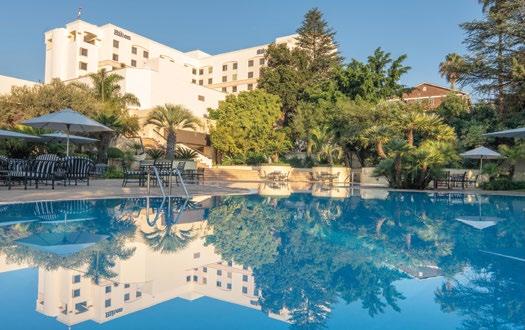

MEETINGS AND EVENTS
Hilton Sandton offers distinctive spaces in a prime location for conferences and events. Each of its nine meeting rooms is completely customisable and features state-of-the-art technology. For added convenience, meeting facilities are located on the same floor as the full-service business centre, restaurants and bar.
ACCOMMODATION
All Hilton Sandton’s guestrooms feature stylish furnishings and generous amenities. Guests who stay in the Royal Suite or one of the six Terrace Suites on the Executive Floor can enjoy exclusive access to the Executive Lounge. Hilton also offers non-smoking and four accessible guestrooms. Guestroom facilities include LCD televisions and satellite channels with radio, video-on-demand and Wi-Fi.
CATERING



Sample a multicultural all-day dining experience at Tradewinds Restaurant & Bar. For the best of fusion flavour, the Lotus Teppanyaki & Sushi Bar offers a variety of popular sushi dishes, all carefully created by Hilton Sandton’s sushi master. For an intimate get-together with friends or a quality corporate team-building experience, join the hotel’s Sushi School on Friday nights.


MEETING SPACES 12 MAX PAX 900 ACCOMMODATION 329 ROOMS
VENUES AND CAPACITIES +27 (0)11 322 1888 jnbsa_bqsales@hilton.com sandton.hilton.com Room Name Boardroom U-shape Theatre Classroom Cabaret Banquet Dinner Dance Cocktail Hilton Ballroom - - 900 450 270 450 380 1 000 Ballroom 1 40 50 200 90 50 100 80 180 Ballroom 2 70 70 300 150 96 160 120 300 Ballroom 3 50 50 200 100 72 120 70 240 Kwena Suite 40 35 100 60 42 60 40 100 Kwena 1 20 15 30 20 12 20 - 30 Kwena 2 20 15 30 20 12 20 - 35 Li-duba 30 30 80 40 30 50 30 75 Tau 30 30 80 50 35 60 40 80 Umkombe 30 28 80 40 30 50 30 80 Thema 16 12 20 15 - 20 - 25 Boardroom 14 - - - - - -Impala 10 10 15 10 - 15 - 20 Dzimba 10 10 15 10 - 15 - 20
138 Rivonia Road, Sandton, Gauteng hilton sandton
HiltonSandton
16 • MEETINGS l NOVEMBER/DECEMBER 2021 www.theplanner.guru
CHALLENGING TIMES
What’s up with all the challenges?
Everywhere you look online, there’s a challenge for something.
The ‘5-Day Focus Challenge’, the ‘4-Week Get Fit Challenge’, the ‘30-Day Pay-check to Profits Challenge’. There is even a challenge teaching you how to run challenges!
One needs to ask, why?
The short answer: they work!
They work for the challenge participant looking to get some result in their lives or achieve some goal. And they work for the people running these challenges, as evidenced by the hundreds of millions of dollars generated in sales through these powerful marketing tools.
So, let’s take a look behind the curtain and see precisely why challenges have become the hottest craze taking the marketing world by storm.
WHAT IS A CHALLENGE?
Before we take a deep dive into this world, let me clarify what a challenge is for the uninitiated. A challenge is a time-bound, virtual learning experience, which focuses on one primary outcome for the participant by helping them take action. These can be either free or ticketed experiences online.
What are the benefits for the challenge participant?
• The participant can get a result or achieve a goal quickly.
• They can try a new activity or learn something new, usually for free or at a low price.
• The free challenge eliminates the fear of the unknown by sampling the teaching.
• The participant can test the quality of the frameworks with little commitment.
• The challenge reverses risk for the buyer/participant.
• The participant builds belief in themselves by completing the challenge.
• The participant can build quickly trust and rapport with the trainer, coach or expert.
• The participant receives value from the expert up front.
What are the benefits for the challenge marketer?

• Challenges are popular and easily accessible online.
• Challenges can attract new customers quickly, from a global audience.
• Challenges can generate revenue quickly; what might have taken months to produce can now be made in a matter of days.
• The challenge not only helps find your dream customer but creates your dream customer in the process.
• The challenge provides a platform to serve your customers at a higher level.
• The challenge allows the expert to
deliver value and prove their credibility before ever asking the customer to purchase anything.
• The challenge facilitates creating connections with and building a community of your customers.
• The marketer can focus their advertising spend on a very niche target market.
• The expert can solve problems at scale by teaching frameworks and methods to large audiences very cost-effectively.
• Once participants have achieved a result and would like to engage further with the programme or the expert, the marketer can make an offer to them for billable services.
• The sales conversion rates on challenges are usually significantly higher than traditional sales methods.
Simply put, the online challenge is the quickest way to take cold audiences and turn them into highly engaged customers. In my opinion, they offer one of the fastest accelerators of digital sales success and should form part of any modern company’s online marketing strategy.
Scott Langley is the director and founder of Kaizen Alpha Marketing, a marketing consultancy based in Durban. When he’s not building digital sales funnels for his clients, he spends his time with his family or falling off a surfboard at his local break. You can read more about him here.
www.theplanner.guru MEETINGS l NOVEMBER/DECEMBER 2021 • 17 INNOVATION
Challenges abound. Kaizen Alpha’s Scott Langley gives his take on how to have fun with this.
HAVE THE RULES OF BUSINESS TRAVEL ETIQUETTE CHANGED?
LIfe looks a quite different since the dawn of Covid-19 – face masks, elbow greetings, temperature checks at practically every entrance, and an overwhelming amount of sanitiser dominating our days. And business travel definitely isn’t an exception. Not only has the way in which we travel transformed – think pre-travel Covid-19 tests, proof of vaccination and mask mandates, etc. – but the etiquette surrounding the intricacies of our business trips has changed too.
Are handshakes back in or is the slightly awkward ‘elbow bump’ here to stay? How do you approach management to request a business class seat as opposed to sitting in economy when you’re worried about social distancing and possible exposure on board your flight? Are tangible business cards still acceptable, or are they seen as a Covid-19 risk? If so, what’s the alternative?
Oz Desai helps us unpack these questions.
BUSINESS TRAVEL CONFIDENCE
According to Business Wire, corporate travel levels are expected to rise up to an estimated 70% of pre-Covid levels by the end of 2021, but that doesn’t mean that everyone is feeling confident to get back to ‘normal’ just yet.

Organise a sit-down with HR, management and your company’s TMC (travel management

company) to discuss measures that could help you feel more comfortable about the prospect of a business trip, such as a carefully tailored itinerary, vetted accommodation, direct flights and whether premium cabin travel is an option. Of course, you’ll need to be fully vaccinated at least two weeks before you’re due to depart for optimal protection and peace of mind, Oz explains.
FLIGHTS AND ACCOMMODATION
Many corporate travellers will naturally feel uneasy about travelling economy class due to concerns about social distancing. While airlines have gone out of their way to maximise safety for all passengers, you’re still well within your rights to request an upgrade from management if it will make you feel calmer about your impending trip.
Also, keep in mind that a higher star rating doesn’t necessarily mean that a hotel is ‘safer’. Instead, it’s important to conduct lots of research into the various Covid-19 protocols put in place at a prospective accommodation establishment.
“This is where a reputable travel management company (TMC) really comes in handy. The team will have handled the required investigations to ensure that all business travellers are booked into a hotel or guesthouse where their safety is viewed as absolutely paramount. Travellers who still feel uneasy regarding the accommodation chosen for them should request a detailed list and explanation of these various protocols,” comments Oz.
PUBLIC TRANSPORT
If you’re feeling uncomfortable about using public transport, you can always request to hire a personal vehicle for the duration of your stay. However, note that rental cars are currently in
www.theplanner.guru
SEPTEMBER/OCTOBER 2021 FOCUS BUSINESS TRAVEL
Many corporates may be nervous about travelling during a pandemic. Oz Desai , GM of Corporate Traveller, shares a few tips to help ease us back into the swing of it.
short supply across the globe, in large part due to the fact that many vehicle rental companies sold off a decent portion of their fleet due to the economic impact of Covid-19. As such, Oz says it’s vital to discuss your preference to hire a car with management and your company’s TMC well ahead of time to avoid any issues or disappointment.
For your own safety and that of others, it’s crucial to bring any lack of passenger compliance to the attention of your flight attendants. They will be well trained on how to deal with the situation swiftly and appropriately.
FACE-TO-FACE MEETING ETIQUETTE
Oz insists that you should always enquire regarding a company’s unique Covid-19 procedures, protocols, and requirements before attending any in-person meetings. For example, you might be expected to fill in health questionnaires or to bring your proof of vaccination along. Not only will enquiring about these particulars help to ensure that you’re fully compliant, but it will also provide you with peace of mind that your health and safety has been made a priority while doing business at that establishment.
The handshake has been a go-to greeting for centuries but considering how the Covid-19 virus is spread, it’s still currently very much in limbo. “Ultimately, handshakes are safer if you’ve been vaccinated, but that doesn’t mean you’re 100% safe from infection! If you do decide to shake hands with someone, it’s recommended to wash or sanitise immediately afterwards. If you choose not to shake hands, rest assured that most people won’t take offence. At
the end of the day, it’s a personal decision, and everyone’s decision regarding the matter should be respected,” Oz explains.
If you’re firmly against handshakes, it might be to your benefit to get hold of a ‘Forgive me if I don’t shake hands’ sticker, now widely available across the globe and easy and affordable to have custom-made, to steer clear of any uncomfortable situations or conversations at business meetings, gatherings or conferences, Oz adds.
Keep in mind that it isn’t good etiquette to be the first to extend your hand when greeting someone. “Even if you are personally comfortable with performing the age-old greeting, the other person may not be,” he notes.
MASK WEARING
While we are quite used to wearing face masks in all public spaces in South Africa, many countries around the globe have relaxed their mask mandates.
For instance, it’s no longer a legal requirement for people to wear masks in England, although it is still recommended to do so in crowded places. Other mask-free countries (with some restrictions and exceptions in place, such as being fully vaccinated) include Sweden, the United States, New Zealand, and China, to name just a few.
Wearing a mask in a mask-free country is a personal decision, and you should feel fully empowered to cover up without any hesitation whatsoever, Oz advises.
PHYSICAL BUSINESS CARDS
Professionals still give out tangible business cards in most countries, although there are some who choose not to give them out nor accept them
for Covid-related reasons. Luckily, there are a few safer and creative alternatives to consider, like QR codes. There are also a few new apps that enable contactless detail sharing among business professionals.
“Popl is an example of one of these apps and is a fast-growing resource for fashioning a ‘digital business card’. The app uses near-field communication technology in the form of a tiny tag that you stick to the back of your smartphone. When scanned, this tag instantly transfers your professional and contact details to another person’s smartphone, regardless of whether or not they have their own tag or have downloaded the app,” says Oz.
AFTER YOUR BUSINESS TRIP
You’ll want to keep a close eye on your health and take note of any possible Covid-19 symptoms should they present within two weeks following your trip. Oz explains that if you do show any signs of illness, be sure to let management and your company’s TMC know immediately so that they can organise a Covid-19 test and, if necessary, notify everyone with whom you were in contact during your journey. Be sure to self-isolate until you receive your test results!
Now you know everything that you need to know to ensure safe, comfortable and confident business travel as the industry slowly recovers.
“Keep up to date with the various travel-related changes, take out comprehensive travel insurance, and equip yourself with the emergency contact details for your company’s trusted TMC should you need support before, during, or after your travels, breathe, and enjoy every second of your business getaway!” concludes Oz.

www.theplanner.guru MEETINGS l NOVEMBER/DECEMBER 2021 • 19 #ETIQUETTE
DON’T LET YOUR GUARD DOWN!
Few industries suffered under the ongoing South African Covid-19 lockdown to the same extent as the beleaguered events and exhibitions industries. Finally, after 20 long months, we have arrived at Alert Level 1, where capacities have been relaxed to accommodate 750 people indoor and 2 000 outdoors, spectators are being allowed into sporting events, and pilot projects for larger capacities are in the planning stages.
The industry and its diverse supply chain of organisers, production teams, entertainers and speakers, venues, technical production and accommodation partners finally have the opportunity to resume work, albeit on a reduced scale. The excitement is palpable as planning starts to resume and stakeholders discuss what 2022 might hold for events. However, the lockdown has been in place for so long that Covid-fatigue has set in and – as tired as we are of hearing what we should, or shouldn’t, be doing – we must ensure that the focus on safety awareness is not diluted in the wave of excitement. If we
do not stand together as an industry, remain vigilant, vaccinate and help each other, we run the risk of suffering a major setback by damaging client and attendee confidence or, worse still, inadvertently causing a spreader event.

CREATING CONFIDENCE
Across the board, our clients want to feel secure when mounting an event. Ellen Oosthuizen, chairperson of the Professional Conference Organisers Alliance, highlighted a new trend surfacing among corporate clients. “Some of our clients are requesting that we only put forward venues and production teams where staff and organisers are fully vaccinated, so this is becoming a prerequisite for events. Along with that, the venue must be demonstrably safety-savvy from arrival. Clients want to see all safety protocols in place – from having the TV control in a plastic cover and having no magazines on the coffee table or desk, to wiping the microphone down between speakers and having food individually wrapped rather than
open, buffet-style catering,” she says. The exhibition industry is prepped and ready for lift off but is awaiting the goahead from government.

“We have evaluated our protocols, collaborated with our suppliers and venues, and are currently educating our exhibitors and sponsors on the new ways of doing business at exhibitions,” notes Projeni Pather, chairperson of the Association for African Exhibition Organisers, adding that our expectations need to shift to work in line with our current and future environment.

“Our optimism has risen as government has led the way, with the first large-scale exhibition, IATF (Intra-African Trade Fair), happening this November at the Durban ICC – where an expected 10 000 visitors has been advertised. Following this major feat is SA Tourism’s announcement of dates for South Africa’s window to the world, Meetings Africa in February 2022, and Africa’s Travel Indaba in May 2022. To keep up the momentum, we will continue to work with government to ensure the swift reopening of the exhibitions industry,” Projeni says.
BIG CONCERTS
Justin Van Wyk, CEO of Big Concerts, deals with much larger live entertainment events and has been working closely with Business4SA to make vaccinations easily accessible to all. He asserts that widespread vaccination is the key to reopening larger events and that it is up to everyone involved to take responsibility for safety. “Our clients

20 • MEETINGS l NOVEMBER/DECEMBER 2021 www.theplanner.guru HEALTH & SAFETY
“Relaxed capacities don’t mean relaxed protocols,” say members of the SA Events Council.
Meetings hears more
Justin Van Wyk
Projeni Pather
Ellen Oosthuizen
trust us to implement, and comply with, all appropriate and reasonable safety measures recommended by any relevant government or competent authority (relating to Covid-19) in connection with our respective obligations to safeguard the health, safety and well-being of all attendees, personnel, representatives and invitees,” he says.
Big Concerts has just announced that tickets will go on sale this December for a One Direction tour in 2022, where the field will be open to vaccinated attendees only. For this type of larger event, allocated seating, presold tickets, managing entrance and exit traffic flow, and contact tracing are critical issues. It is much the same for sporting events, where the risk of jubilant spectators leaving their allocated seating to amass closer to the action is a real risk to everyone’s safety.
INCENTIVE TRAVEL
Tes Proos, president of the Society for Incentive Travel Excellence for Africa, deals mainly with travel groups from abroad. “While I’ve had a few questions from international clients as to South Africa’s vaccination status, most concerns are about PCR testing for multidestination trips in terms of impact on their trip and cost. Vaccination is a matter of choice and the impact is more on the employer from a financial and HR perspective. It remains to be seen whether vaccinations across the workplace can be made mandatory – it’s a very sensitive issue and should be properly investigated.”
A UNITED FORCE
As a coalition of associations that span a wide range of events, members of the SA Events Council have realised that – across business events, exhibitions, sporting or live entertainment events – there are basic safety principles that must be upheld consistently to keep the industry moving forward. With this in mind, they encourage all venues, organisers, suppliers, participants and attendees to remain mindful of the need to:
• Mask up – No mask, no entry.
• Do temperature checks – Anyone with a temperature higher than 37.5°C should not be allowed to enter.
• Maintain social distancing – Provide and adhere to allocated seating and visitor flow management.
Tes highlights the issue of people becoming more complacent because they are fully vaccinated, and then the rules go out of the window.
“As an industry, we all practise what we preach and do everything possible to maintain safety protocols, but we
• Sanitise regularly – Venues must be sanitised before attendees arrive, and ideally refreshed during breaks. There should be visible sanitising stations throughout the venue, at all entrances and exits, bathrooms, food areas, lecterns and on coffee tables during panel discussions. Equipment such as microphones must be cleaned between each use.
• Produce proof of health status – All attendees and staff must present proof of vaccination. If for medical or personal reasons they cannot be vaccinated, a negative Covid-19 test should be presented.

• Arrange contactless ticketing –Tickets are preferably to be sold online, in advance.
• Track and trace – All attendees must provide their name, surname,
are seeing transmission take place predominantly from irresponsible social interactions. We cannot police delegates’ behaviour outside our event zones and therefore encourage people to remain safe and follow protocols at all times,” she concludes.
address and contact details for contact tracing.
“As members of the events industry, we must bear in mind that our responsibilities do not begin and end with the event we are managing. We need to work together with suppliers that might be involved peripherally, especially if the event will take place over several days with attendees using transport shuttles, being hosted at designated hotels, and dining in partnered restaurants. While it is not our place to police the protocols of associated partners, prior communication around expectations is a step towards keeping our attendees safe, and we can certainly bring lapses to the attention of the GM or manager in a professional manner,” says the SA Events Council.
#H&SPROTOCOLS
www.theplanner.guru MEETINGS l NOVEMBER/DECEMBER 2021 • 21
JACK BE NIMBLE
FAME Week Africa 2021 caused a splash within the film, arts, media and entertainment spheres. We hear from organisers RX Africa on why this event was so significant.



RX Africa launched FAME Week Africa in October 2021 in partnership with hosts City of Cape Town. The event is now set to become Africa’s annual cornerstone of business development for the film, arts, media and entertainment (FAME) industries.
Connecting industry professionals and creatives, while turning every moment into an opportunity, FAME Week Africa transformed three days of networking, meetings, screenings and conferences into lasting business.
“Planning the live event took place during the Covid-19 pandemic, which presented distinct challenges that had to be met head on to achieve any measure of success. However, we had a new weapon in our arsenal,” says Carol Weaving, managing director, RX Africa.
With the global rebranding of Reed Exhibitions in June 2021 to RX, a new code was created as the
foundation of all employees. Known as RX Nimble, the code provides a platform of six strengths that ensure RX employees can move forward as a united team and produce events that are highlights on the calendar for the industries that they serve.
‘Nimble’ is an acronym for Networked, Inclusive, Magical, Brave, Love of Learning and Entrepreneurial. It is here where the RX Africa team used FAME Week Africa as a showcase of each strength, which contributed to its massive success.
NETWORKED
For FAME Week Africa to acquire the respect of industry professionals locally and internationally, the organisers required highly valuable and wellnetworked entities to work as a team. From the outset, RX brought in industry professionals who are experts in their field to represent various markets.
“Over and above the members within the FAME Week Africa team, a wide variety of film, art, media and entertainment professionals were included to contribute valuable ideas and opinions in various industries, enabling us to host virtual meetings throughout 2021 leading up to the event in October,” says Judy Goddard, event director, FAME Week Africa.
In the months leading up to FAME Week Africa, the FAME team continuously explored new and innovative ways to create space for the relevant industries to connect and network – thus FWA Connect was born.
“The success of FAME Week Africa reflected the real benefit of networking in the exchange of information, advice and referrals; with the appropriate people bringing their expertise to what is the true benefit of networking: More minds are better than one,” Judy notes.
INCLUSIVE
RX is a place where opportunity is open to all. Humans are built for connection and everyone feels included. RX understands the need to constantly hold itself accountable to be aware of blind spots and embrace and include the diversity
www.theplanner.guru
EVENT SHOWCASE
‘Nimble’ is a code underpinning every step towards prosperity –not only for FAME Week, but for every event, business decision or opportunity presented. It is not theory; it is a code for living
of thoughts and experiences that make life so interesting and creative. This ethic is encouraged in all staff, as part of the RX culture.
RX consciously works towards inclusivity at all times; FAME Week Africa is an example of bringing together various backgrounds, ethnicities, cultures, experiences, places and spaces to ensure it reflected a plethora of diverse voices, each speaking to where they come from.
FAME team members continuously held each other accountable to include holistic diversity in the content, programme and events at FAME Week Africa. The film, art and entertainment bus routes across the City of Cape Town shared important stories and creative work of individuals from diverse backgrounds and ethnicities.
MAGICAL
RX encourages members to enjoy the process of creative events, have fun and be proud of what they do. The FAME Week Africa concept itself allowed the team members to do precisely that – it’s no secret that the film, art, media and entertainment spaces are known as the fun, creative, exciting industries and the event turned this into a huge celebration of this culture.
Since the beginning of time, magic and art have existed hand in hand. From a philosophical viewpoint, the link between art and magic displays
risks – and what could be riskier than an event of this magnitude, taking place in a regulation-rich pandemic, with content focused on the very industries shut down by the pandemic?
RX knew the industries needed an organisation to place the big bets to revive and reinspire those sectors that so desperately needed it. RX did exactly this – it played big and won.
Constant unknowns abounded, including the changing of lockdown levels, protocols, travel and crowd restrictions, RX stepped into the ring with vigour. Bravery was key and RX took it on the chin, constantly exploring alternatives and possibilities. Teams shared and implemented their learnings and moved forward with confidence.
“Martin Hiller, content and creative director of FAME Week Africa, personified bravery in bringing his wildest ideas to the FAME Week Africa team, who were encouraged to be brave enough to take on the challenge of bringing Martin’s ideas to life! This bravery contributed vastly to the massive success of FAME Week Africa as well as reinvigorating all sectors of an ultra-creative community in dire need of inspiration,” said the RX Africa team in their official communication.
LOVE OF LEARNING
As South Africa continues to comply with national lockdown regulations, difficult but necessary decisions were made to ensure a safe event for as many people as possible to attend and enjoy FAME Week Africa within Covid-19 protocols.
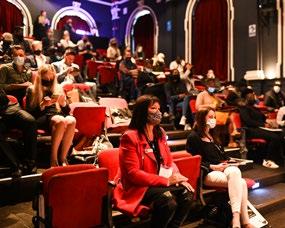

ENTREPRENEURIAL
RX members are encouraged to “act like a founder” for all events. This approach enabled team members to have an entrepreneurial mindset, constantly looking for opportunities and feeling empowered to make decisions responsibly.
The culture made FAME Week Africa a safe space for team members not only to share their wildest ideas, but also to put their best foot forward for any action or role over and above their designated position in the FAME Week Africa team.
Entrepreneurship was a constant thread throughout the FAME Week Africa 2021 programme content, with entrepreneurs as panellists and hosts at the event. Topics discussed throughout FAME Week Africa were heavily focused on entrepreneurship and the values of entrepreneurship.
the hidden rules of nature, investigates the visible world, and showcases the realm of dreams and desires.
RX Africa knew the imperative role FAME Week Africa would play in supporting the revival of these industries and the magic they engender.

The event filled the magic role with the joy, inspiration and wonder – from the film, art and entertainment bus routes to the glamorous welcome party and the fabulous FAME Reel Talent Showcase red-carpet gala extravaganza. Throughout FAME Week Africa, the magic was underscored by laughter, joy, music, inspiration and entertainment.
BRAVE
Trying something new always means taking
In taking on the task of creating FAME Week Africa, RX knew there would be huge opportunities for learning and growth, given the event is the first of its kind, as well as the challenge of working around a global pandemic. It was the perfect playground for growth, learning and innovation.
One of the learning curves FAME Week Africa brought was the uncertain up-and-down of travel bans, lockdown level changes and event capacity restrictions. RX quickly learned that the constant lockdown changes were continuous, and often spontaneous, as the behaviour of the virus was novel and unpredictable.
RX approaches challenges with a mind unconfined by rigid, preconceived ideas about how to do things. Its teams have the humility required to learn from others and are curious enough to seek and share learnings.
The RX Nimble Code had a significant role in the success of FAME Week Africa 2021, and RX Africa was responsive in applying Nimble whenever an opportunity presented itself.
“The team embraced and applied their love for learning, enabling them to be agile and adapt to sometimes daily changes. RX believes the very essence of entrepreneurship instinctively led each member of the FAME Week Africa team toward the success of the now-annual event,” concludes Carol.
www.theplanner.guru MEETINGS l NOVEMBER/DECEMBER 2021 • 23
#FAMEWEEKAFRICA
rxglobal.com/rx-south-africa
Being seen
Many people will know you as a master illusionist, speaker and entertainer. How has the pandemic affected what you do, and how have you adapted your offering to ensure you stay relevant?
I was on tour in Florida, USA, when we started realising what the Covid thing was all about. Events cancelled, flights changed, and I came home. Luckily with enough time to buy our fair share of toilet paper.
For the first few weeks, I was a deer in headlights and waiting to reschedule the shows and get back on tour, continue doing what I have always done.
Once it became rather obvious to me that I needed to get on board with virtual entertainment, I started getting creative and rebuilt my shows and talks for the virtual world.
Why would someone pay to watch a virtual show as opposed to watching Netflix? What is the one thing I can do for my guests that Netflix can’t?
My answer: it’s not just a show, it’s an experience. You don’t just watch magic, you experience it.
People get involved in the show, I have the magic happen on their side of the screen, in their hands – Netflix can’t do that! I wanted my audience to be an intricate part of the show, interacting with me.
I had to learn the tech to improve my guests’ watching experience. My talk presentations and slide decks became more immersive and a lot more engaging by moving everything over to Prezi (if you have not seen what they have been doing to live presentations, go check out prezi.com and thank me later). I had to pivot, invest in equipment, make changes to my
presentations and it worked out for the better!
What for you makes for a successful gig? How do you gauge audience responsiveness and how do you know if your message has been received? If they laugh, ooh, ahh and gasp at the right times.
From the get-go, one needs to set things up correctly. A show is planned to engage your audience; it builds with highs and lows, and I’ve always made sure that there’s a takehome point.
An audience will let you know if you have them eating out of your hands or not, and it’s up to you as an entertainer to make sure you’re doing your job!
Because illusionary arts, magic and mentalism are not well understood as an entertainment art form, and how magic can be used in business talks, I have never left it to the audience or guests to come to their own conclusions. I interweave my magic with a corporate’s message.
Due to the Got Talent franchises, it has made it easier for illusionists and mentalists, but there is still room for growth.

24 • MEETINGS l NOVEMBER/DECEMBER 2021 www.theplanner.guru
Q&A: ENTERTAINMENT
Popular South African entertainer and speaker
Ilan Smith shares his experiences and thoughts with Meetings magazine on what it is like working in the industry during a pandemic.
Should you hire a comedian, musician or singer for your event, you know exactly what’s going to happen that night – therefore it is much easier for the bookers and audience to utilise their services.
For my virtual events, I create a short video welcoming and educating everyone on what to expect from the event. I like to call it “leading them down your garden path”.
I introduce the concept of an interactive show or talk and to be prepared for the magic that will happen in their hands. They need to have a few simple household items handy – a magazine of their choice, pen, paper and a few cards.
When it comes to talks, I constantly check in to make sure my audience is engaged. Should I not get back an enthusiastic answer, I’ll reiterate what I said with a different example.
What drives you to keep doing what you do?
Passion. And my wife and kids. I really love what I do. I believe my shows share a sense of wonder and help people believe that anything is possible. From the talks’ point of view, I really do believe the content can change lives. How can you not love it?
What is your advice to up-and-comers who are looking to make a break into a similar space?
Don’t do it, I already have enough competition! ‘Show business’ is made up of two words, and both are important. There is a huge difference between creating a good talk, delivering a good talk, and selling a good talk. Just like making a good burger is very different to selling a good burger. It’s not only about the magic; you also need to focus on the business aspect.
What can we look forward to from Ilan Smith in the next 6 to 12 months?
Follow me on LinkedIn, Instagram and Facebook – there is lots more mystery to come!
What is your message to anyone currently trying to make it as an entertainer?
I am not sure if Rome was built in a day, but I know life and businesses are not. If you think back to one of your beliefs you had growing up that you disagree with now, you realise your ideas change and you grow. Be bold and question certain beliefs you now hold, and always keep learning.
WHO IS ILAN SMITH?
Ilan Smith, internationally renowned as a corporate speaker, entertainer and illusionist, is an acclaimed mentalist and innovative thinker. He spends his time travelling (pandemic permitting), performing and deliverin g his creative problem-solving talks for companies and audiences around the gl obe.

He is passionate about looking at the world from a new perspect ive. These days, he delivers these talks globally from the comforts and sa fety of his home office, leading by example that one truly must innovate and adapt to change as the world around us challenges us with uncertainty.
Ilan combines his knowledge of the human mind, creative problem -solving strategies and innovation to provide you with the tools towards a positive paradigm shift, and motivational upliftment that you’ll need to accelerate your path towards success and innovation.
Ilan has presented for Fortune 500 companies and travels betwee n South Africa, the USA, Canada and Australia doing what he loves. For him, it is all about empowering people to new levels of real-life practical so lutions to inspire, lead, sell, negotiate, problem-solve and live in an en tertaining way. He sees the benefits and potential in this business, and wants t o bring it to the people in South Africa.
www.theplanner.guru MEETINGS l NOVEMBER/DECEMBER 2021 • 25 #MAKINGMAGIC
CHANGING PERCEPTIONS
The detection of a new Covid-19 variant, first announced by South Africa, has seen a slew of countries and national airlines cancelling flights and implementing travel bans. While the travel bans apply mostly to several nations from the Southern African region, the variant is now reported to have been detected in countries on every continent (other than Antarctica).
The B.1.1.529, or Omicron, variant of Covid-19 was confirmed by the World Health Organization (WHO) on 26 November 2021.

“The B.1.1.529 variant was first reported to the WHO from South Africa on 24 November 2021. The epidemiological situation in South Africa has been characterised by three distinct peaks in reported cases, the latest of which was predominantly the Delta variant. In recent weeks, infections have increased steeply, coinciding with the detection of B.1.1.529 variant. The first known confirmed B.1.1.529 infection was from a specimen collected on 9 November 2021. This variant has a large number of mutations, some of which
are concerning,” said the global body in a statement on its website.
Meanwhile, Dr Michael Ryan, head: Emergencies at the WHO, has urged decisionmakers and the international community to not have a “knee-jerk reaction” and to see what the data reveals.
“We’ve seen in the past, the minute there’s any kind of mention of any kind of variation and everyone is closing borders and restricting travel. It’s really important that we remain open, and stay focused,” he noted.
SOUTH AFRICA’S GOVERNMENT RESPONDS
South Africa’s Minister of Tourism, Lindiwe Sisulu, delivered a statement on 26 November 2021 noting that the country would continue to work with other nations to prevent the spread of the virus.
“While this is most disappointing, South Africa will continue working with policymakers in the UK, Japan, Israel and EU to ensure that the best possible interventions are put in place. I would
WHAT WE KNOW THUS FAR ABOUT THE VARIANT
• Following a “detrimental change in Covid-19 epidemiology”, the WHO designated the B.1.1.529 a volatile organic compound, naming it Omicron

• This variant has many mutations, which are “concerning”
• Evidence suggests the variant carries a higher risk of reinfection


• Reported cases are observed to be increasing in most provinces within South Africa
• Existing SARS-CoV-2 PCR tests continue to detect this variant
• There is an absence of a target gene called S gene dropout or S gene target failure, which can be used as marker for this variant, pending sequencing confirmation

26 • MEETINGS l NOVEMBER/DECEMBER 2021 www.theplanner.guru UPDATE: COVID-19 VARIANT
With a spike in the number of other countries detecting the new variant of Covid-19, several nations have implemented worldwide travel bans that may mean a further setback for tourism and events. Meetings learns more.
Lindiwe Sisulu, South Africa’s Minister of Tourism
like to commend the South African scientists on their diligence and all the work they have done, and remain confident that all measures will be put in place to mitigate the spread of the virus. We remain open for business and tourism travel – and we appreciate the continued support from various partners across the world – and are confident that through the tourism recovery plan in place, we
TRAVEL RESTRICTIONS
will reignite demand and once more be tourism strong,” stated Minister Sisulu.

The announcement of the new variant and subsequent travel bans has also seen South Africa’s Department of International Relations and Cooperation (Dirco) make several statements relating to the already-implemented bans.
“While we respect the right of all countries to take the necessary precautionary measures to protect their citizens, we need to remember that this pandemic requires collaboration and sharing of expertise. Our immediate concern is the damage that these restrictions are causing to families, the travel and tourism industries and business,” commented Minister Naledi Pandor in an official Dirco release.
South Africa is said to be engaging with numerous countries to urge them to rethink their decision.
“Our immediate concern is the damage that this decision will cause to both the tourism industries and businesses of both countries,” said Minister Pandor in a separate statement made by Dirco a day earlier.
As at 28 November 2021, SkyScanner reported that the following restrictions were in place for travellers from South Africa (four countries have unknown travel restrictions in place):
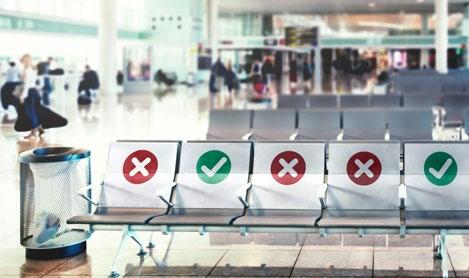
51
LOW RESTRICTIONS
You can visit these countries. You’ll likely need proof of a negative Covid-19 test or vaccination to travel.
26
MODERATE RESTRICTIONS
Visiting these countries is possible, but you may have to quarantine on arrival or return. You might also need to show proof of vaccination or a negative test result.
79 MAJOR RESTRICTIONS
There are 79 countries with major restrictions. Travel to these countries is not advised. Their borders may be completely closed to non-residents or non-nationals.
REPUBLIC OF MAURITIUS SUSPENDS COMMERCIAL FLIGHTS
After the emergence of the B.1.1.529 Covid-19 variant was announced and following the decisions announced by many governments worldwide, on 26 November 2021, Mauritius announced that it would suspend all commercial flights from several Southern African nations, including Botswana, Eswatini, Lesotho, Namibia, South Africa and Zimbabwe.
Mauritius’ pandemic response has been widely recognised and commended as one of the most effective globally, thanks to its strategy of stringent precaution and swift implementation of travel policies.
Arvind Bundhun, director of the Mauritius Tourism Promotion Authority, said: “It is with regret that the Government of Mauritius has today taken the decision that all flights from these countries will be suspended from next Monday, 29 November till Friday 31 December 2021.
“Since the onset of the pandemic, Mauritius has imposed one of the most efficient pandemic responses. Maintaining this approach necessitates that we continue to follow a strict, public-health-first approach in our Covid policies, including caution on inbound travel.
“The Government of Mauritius looks forward to welcoming visitors from these countries as soon as the public health situation improves.”
Mauritius’ borders remain open to all other countries. The island nation has welcomed over 100 000 visitors to its shores since reopening its borders to international travellers on 1 October 2021, after 18 months of being shut.

www.theplanner.guru MEETINGS l NOVEMBER/DECEMBER 2021 • 27 #OMICRON
INDUSTRY VIEWS
Committed to sustainability
How events can address climate change
The Joint Meetings Industry Council (JMIC) hosts this initiative to connect the global events industry to a rapidly growing movement towards achieving net-zero emissions by 2050 and to realise a 50% reduction by 2030. “The aim of the JMIC is to grow this initiative, which represents the events industry as a whole, and to provide a collaborative commitment we can all act upon,” says the JMIC.

Sustainable development has long been a focus for the events industry. Connected to programmes like the United Nations’ Sustainable Development Goals (SDGs), industry initiatives have addressed everything from waste management and energy conservation to local sourcing and hiring practices. The principles of sustainability are now firmly imbedded within industry practices and client expectations.
Now, following the devastation caused by Covid-19 on the events industry and the lessons that have been learned about the fragility of our environment, as well as the impacts that our behaviour has on our collective futures, focus is intensifying even further with the realisation that we need to accelerate our actions in response to the threat of climate change. This focus is not only to secure our own industry’s future, but to support the many other sectors we rely on for our existence.
WHY NOW?
Engaging with this initiative now means that the EGF and South Africa’s MICE sector have become part of
a global collaboration for action – for failing to act in a meaningful and committed way, risks being left behind as the global response builds.
World leaders met in Glasgow, Scotland, at COP 26 to present how their countries will achieve the 50% reduction in carbon emissions by 2030 in order to deliver on the Paris Agreement. For- and non-profit organisations from across all sectors are setting forth their own pathways towards this goal, and the ultimate goal of net zero by 2050.
Through this initiative, the JMIC aims to link all stakeholders in the corporate, professional, academic and destination communities worldwide that have also committed to engagement in what is one of the biggest collective challenges we all face today, and to invite those that have not done so yet to join.
The new initiative arises from the work of an organising task force initiated by JMIC members UFI, AIPC and ICCA – joined by representatives of Emerald Expositions (US), Freeman (US), HKCEC (China), Informa (UK), Javits Center (US), MCI (Switzerland), Messe München (Germany), RX (UK) and Scottish Event Campus (UK) – and it was born from a discussion with the United Nations Framework Convention on Climate Change secretariat, which is also supporting the initiative.
To read more, visit www.netzerocarbonevents.org or, for further information, contact Lynn Mcleod on +27 (0)82 891 5883 or lynn@eventgreening.co.za.
THE NET ZERO CARBON EVENTS INITIATIVE AIMS TO BRING TOGETHER A WIDE RANGE OF INDUSTRY STAKEHOLDERS TO:
• Jointly communicate our industry’s commitment to tackling climate change and driving towards net zero by 2050
• Develop common methodologies for measuring the industry’s direct, indirect and supply chain greenhouse gas emissions
• Construct an industry-wide roadmap towards net zero by 2050, and emissions reductions by 2030 in line with the Paris Agreement, with support and guidance on key issues
• Foster collaboration with suppliers and customers to ensure alignment and common approaches
• Establish common mechanisms for reporting progress and sharing best practice

28 • MEETINGS l NOVEMBER/DECEMBER 2021 www.theplanner.guru
The EGF has become one of a number of global organisations to have signed up to the recently launched Net Zero Carbon Events initiative, writes Greg McManus.
GREG MCMANUS is the chairperson of the Event Greening Forum (EGF), a member of the SA Events Council.
TALKING POINTS
The other side of the coin
Challenges are opportunities
Over the last few weeks, I have had the opportunity to attend numerous industry events. These have been both energising and inspiring, especially because they happened face to face. The key message I took from these gatherings of event professionals is a very positive one: our industry is extremely resilient, turning challenges into opportunities. The presentation of the events industry pledge at COP 26 to become carbon zero by 2050 is a showcase of this resilience.
During one of the sessions of the AIPC talent programme, participants were asked what they saw as major risks for our industry. The list was impressive, going from unpredictable decisions by authorities on event protocols to losing talents to other industries. This had the potential of being a therapeutic session. Sandy Kennedy, who was giving the lecture, showed us that value creation – in terms of market capitalisation – has never been higher than in the last 10 months. In 2021, the market capitalisation of the top 100 companies rose by a staggering 48% according to a report released by PwC. So, while we feel there is a lot of uncertainty, there are clearly a lot of opportunities, and the events industry is no exception.
To identify these opportunities, we need to think differently. And sometimes, sources of inspiration come from outside our industry. As an example, when fire detectors became mandatory in the Netherlands, one insurance company saw this as an opportunity to engage with its customers by offering a service to install the fire detectors. This eliminated the hassle of finding a company to install the detectors and it meant full compliance with the insurer’s policy. Not only did this result in a new revenue stream for the insurance company, but it also boosted customer loyalty.
If we look at the challenges that convention centres are facing, we see a similar opportunity. Events need to be safe, sustainable, multichannel, provide a return on


investment, leave a legacy, and offer a great experience to the delegates. And organisers need a trusted partner to make all of this happen. For convention centres, this is a clear opportunity to re-engage with their customers and address these challenges – possibly with the support of a third party if it’s required.
THE NEXT STEP
Sustainability remains key to our success going forward. As mentioned by all speakers during the presentation of the events industry pledge at COP 26, sustainability is no longer an option – it is imperative and will evolve into a minimum service standard. Here also, we saw some great thinking demonstrating the ability to turn challenges into opportunities: both Alan Steel from the Javits Center in New York and Monica Muller-Lee from the Hong Kong Conference and Exhibition Centre provided great insights on how they are turning their facilities into examples of sustainability. The full video of the pledge presentation can be found here.
These examples demonstrate that our industry is not only able to handle risks but that we can deal with uncertainty. Risk relates to what is known, while uncertainty relates to the unknown. In both situations, decisions need to be taken. The big difference is that in the case of uncertainty, we do not have any data to base our decisions on. And yet, convention centre leadership across the world did exactly that: being risk managers and navigators of uncertainty.
Seeing what is happening at convention centres across the globe – and especially the mindset of the leadership – makes me very positive about the future of our industry.
during the Future Shapers programme
INDUSTRY VIEWS
SVEN BOSSU is the CEO of the International Association of Convention Centres (AIPC).
#INDUSTRYINSIGHTS
www.theplanner.guru MEETINGS l NOVEMBER/DECEMBER 2021 • 29
Sven Bossu looks at how challenges and their solutions are inextricably entwined.
Your position gives you power, but your decisions make you a leader.”
Sandy Kennedy, CEO, Entrepreneurial Scotland Foundation, and a speaker
INDUSTRY VIEWS
What is going to happen in 2022?
Mark Anderson tells us why 2022 is potentially a big year for the exhibition industry in South Africa.

It’s hard to believe 2022 is just a few weeks away! I’m still trying to process 2019; get my head around 2020; and have yet to get to grips with 2021.
So, how are we all going to cope with what 2022 throws at us?
Face-to-face exhibitions and the conferencing industry are opening up. This has been spearheaded by the government-backed Intra-African Trade Fair (IATF) that recently took place from 15 to 19 November 2021 at Inkosi Albert Luthuli International Convention Centre in Durban. Delegates who attended the exhibition included President of Nigeria Muhammadu Buhari and President Cyril Ramaphosa. The fair is expected to yield trade deals for Africa amounting to US$40 billion (R635 billion). It also created over 1 000 jobs and boosted the economic growth of KwaZulu-Natal.
The IATF is a perfect example of the value exhibitions bring to the local economy and the African continent as a whole. Trade shows, or exhibitions, provide a platform
INDUSTRY VIEWS
Adding value
that links international and local buyers, sellers and investors. Through face-to-face networking, participants and visitors get to share market information as well as investment opportunities.
Important and well-respected B2B trade shows are scheduled to take place next year. Propak Africa, scheduled for March, covers sectors from packaging to printing and plastics. World Travel Market Africa, Meetings Africa as well as the Travel Indaba focus on our key tourism sector. Enlit Africa covers our entire power, energy and water value chain. African Construction Expo relates to our building and construction sector. In September, we will host the third biggest mining exhibition on the globe and the biggest on the African continent, Electra Mining Africa.
The IATF was allowed to run under the current Level 1 restrictions. The entire exhibitions community is trusting that all other exhibitions will be given the green light to run in 2022.
Muchmore than a nice-to-have
Nomaswazi Tinus underscores why the Sustainability Village at Africa’s Travel and Tourism Summit 2021 was so significant.
Locally in South Africa, sustainability villages are growing in popularity. But what are they?

First launched in 2017, a sustainability village is a platform that provides gifting for conference delegates, corporates and guests to source gifts from a variety of local SMMEs through a gift voucher system at an event. The advantage is that SMMEs get to showcase and sell their products to a ready market. Delegates have the option to choose and select exactly what gifts they want to buy and take home instead of being given gifts that they may not appreciate and will likely leave behind at the hotel. This creates a win-win situation that provides ideal gifting for delegates and supports the local economy.
Key considerations when planning a sustainability village:
- intention to support the local economy and SMMEs
- selecting a diverse product offering
- location and visibility of SMMEs at the venue (must be easily accessible, visible and located in a welltrafficked area)
- frequent communication to delegates on vouchers and where to use them

- implementing an effective voucher management system (allocation, tracking and payment). Historically, sustainability villages have been supported by South African Tourism, the National Department of Tourism, and the South Africa National Convention Bureau. During both Meetings Africa and Travel Indaba, sustainability villages were hosted in collaboration with the EGF.
Over the years, Meetings Africa would host between 12-16 vendors, with Travel Indaba hosting close to 30 SMMEs. With events having moved online and using hybrid formats, it is important to continue to emphasise the importance of sustainable events and be part of the initiative to build an inclusive economy by not leaving SMMEs behind.

TALKING POINTS
MARK ANDERSON is a portfolio director at Specialised Exhibitions and treasurer of the Association of African Exhibition Organisers (AAXO).
NOMASWAZI TINUS
View on 2022
i s a member of the Event Greening Forum (EGF) management committee and a founder of African Mamas Crafts.
30 • MEETINGS l NOVEMBER/DECEMBER 2021 www.theplanner.guru
INDUSTRY VIEWS
A cut above the rest
Sustaining our competitive advantage as Destination SA




As we continue the optimistic rebuilding of the business events industry in South Africa, we must not lose sight of what our competitor destinations are doing. While we accept that the rebuild will be domestically driven, at some stage, we will need to shift gear and welcome international delegates back to our shores.
With IMEX Las Vegas having just taken place and our hosting of the Intra-African Trade Fair, many have seen this as the activation of our destination’s trade exhibition sector and the start of us preparing and welcoming back international delegates to Destination SA.
To get to this point, smaller, national business events have played a key role in building confidence within the value chain. These events have kept us alert while keeping a watchful eye on what is happening in other parts of the world. With individuals ready to leave their PC screens and meet in-person,
INDUSTRY VIEWS
Industry inclusion
there is clear evidence of renewed interest in national destination events, with the opportunity to travel.
The industry has witnessed shorter programme formats that allow for more much-needed free time, particularly as delegates have yearned for wellness time. To meet this need, many programmes are including wellness and health segments. This is matched with shorter booking lead times, which is mainly due to the uncertain operating environment that has surrounded us these past 20 months.
Having worked within this challenging environment and gaining the knowledge we have today, building confidence over the past 20 months, which continues to grow, the industry has demonstrated that it can meet safely and responsibly when allowed to work.
Let’s keep an eye on how we maintain our competitive advantage.
Driving transformation
Transformation should be at the top of every industry’s agenda. The events industry is no exception, writes Kevan Jones
About 10 years ago, the Department of Arts and Culture established a task team to drive transformation and black economic empowerment in the events industry. It included several representatives from the larger associations active in the sector, including SACIA’s special interest group, the Technical Production Services Association (TPSA), as well as smaller associations such as the South African Music Promoters Association (SAMPA).
The task team’s primary role was to develop an industryspecific BBBEE scorecard that would establish clear targets for transformation in the events industry, looking specifically at issues such as ownership by black persons, the level of management control exercised by black persons, and training and skills development programmes available that would allow black people to advance within an organisation or sector.
For most of the last decade, the task team has worked under the radar, with an occasional flurry of activity that’s not delivered any progress on their mandate. Things changed with the Covid-19 lockdown. Only 21 days after implementing the Disaster Management Act (No. 57 of 2002), President Cyril Ramaphosa spoke about the “compact for radical economic transformation that advances the position of women, youth
and persons with disabilities”, and expressed his desire “to restructure the economy and create inclusive growth”.
These words lit a fire in the bellies of officials within the now renamed Department of Sport, Arts and Culture, who hit the restart button on a project that had, at that time, been dormant for almost two years. New members were added to the task team. Under the leadership of Oupa Salemane from the SA Music Industries Council, the team has crafted and published a draft BBBBEE scorecard that is specifically relevant to the events industry.
It is perhaps the most radical proposal conceived to transform any sector and has been expanded to include all aspects of the audiovisual industry, including the film and television production sector. If approved by the government, the new scorecard will impact every company that generates more than 50% of their turnover from the events or audiovisual industry, so it is critical that, while the scorecard is in a draft form, it receives input from all industry stakeholders.
For more information on the proposed scorecard, check out this video at www.youtube.com/watch?v=VYVd5KKInEg.
#TRUSTUS
KEVAN JONES is the executive director of the Southern African Communications Industries Association (SACIA).
Following several events that have seen strong participation by South Africa, this could signal the start of welcoming international delegates back to Destination SA. Glenton de Kock encourages the business events industry to maintain its competitive advantage.
GLENTON DE KOCK is the CEO of the Southern African Association for the Conference Industry (SAACI).
www.theplanner.guru MEETINGS l NOVEMBER/DECEMBER 2021 • 31
AFFIRMING OURability

Another year down… while it may not have been one in which we made huge financial profits, it is one where we gained wealth in other areas.
The meetings and events industry plays a significant role in the global economy, and at no time was this more evident than during the past 20 months. While platforms such as Zoom, Microsoft Teams and Google Meet have never been utilised to the extent that we saw during our time in lockdown, the need for engagement across every industry and level of discipline was highlighted, as was the importance of having a platform to do so. This has also resulted in the rise of several mergers and acquisitions in the tech space and, as time progresses, we are also realising the value of the MICE industry as one that filters into all others.
These are the strengths we need to play to and do so with confidence because our abilities and skills in this regard will carry us through the various challenges that have come with the pandemic and lockdown restrictions.
SAME FOCUS, DIFFERENT MEDIUM

Our ability to engage audiences during the pandemic has set aside those who can draw in attendees and successfully deliver impactful content and messaging. Getting to the heart of an issue and unpacking this in an easily understood and absorbed format is an art. Covid-19 warrants its own discussion but, beyond this, we need to identify topics and formats that are going to yield the most constructive and informative
conversations. The objective behind what we do is not merely to tick a checkbox but to stand out in the hearts and minds of our delegates, and keep them intrigued enough that they are interacting.
SOLUTIONS DRIVEN
The challenges we are currently facing will be there whether we frame our discussions in this context, or not. I don’t believe we can ignore these issues; however, I do feel that we should shift both our thinking and messaging to be more solutions driven. We may not always be able to immediately identify solutions but changing our mindsets from crisis-thinking to coming up with actionable agendas will yield the right attitude to tackle the issues we face head-on.
Lastly, remind attendees how far we have come and encourage them to keep going. We have faced many a trial and tribulation throughout the pandemic, but we are evidence of the resilience and strength that has helped us endure this period.
MISS MEET
The Covid-19 pandemic has tested our ability and pushed us beyond our limitations. Stay the course and don’t give up, says Miss Meet
32 • MEETINGS l NOVEMBER/DECEMBER 2021 www.theplanner.guru
A Convergence of Business and Adventure A Convergence of Business and Adventure

Let Ideas Expand Beyond the Office

We have the freshest of air, an abundance of wildlife, the best adventure tracks and trails, breathtaking sights and scenery, but most importantly, we have conference centres in these magnificent tranquil surroundings.
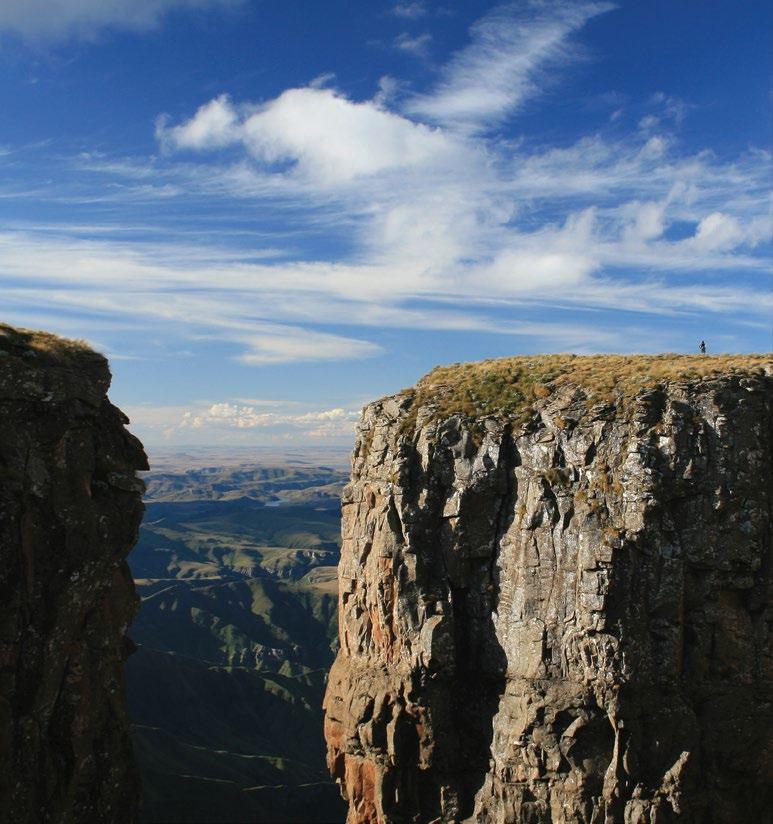
Didima Conference Centre accommodates delegates from 120 classroom style, 60 U-shape style to 120 seated cinema style configuration. Ntshondwe Conference centre offers a cinema style seating arrangement for up to 140, a lecture style for 90 or a single U-shaped for 45 delegates. Ntshondwe’s two breakaway rooms offers a cinema style seating arrangement for 30, lecture style for 18 and single U-shape for 16 delegates. Both conference facilities offer various accommodation options, are fully serviced and can comfortably be adapted from one-day events to multi-day workshops.
The Perfect Wedding
Make your big day perfect with unlimited privacy, breathtaking scenery, birdlife, wildlife, scenic trails, comfortable accommodation, delicious food and personalised service excellence.
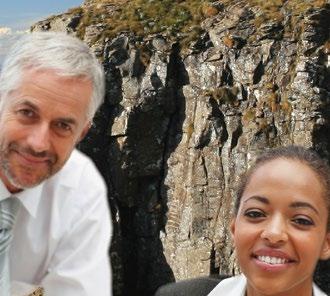
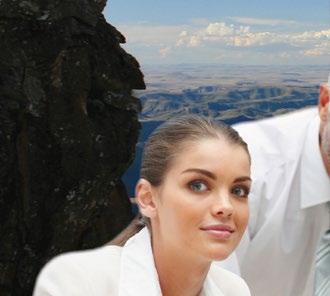
Dream, travel, Discover
C on se r v a t ion, Pa rt n ers h i p s & Ec otou r i s m O n li ne b ook i n g : b ook i n gs .k z n wildlif e.com We b: www .k z n wildlif e.co m
Didima Conference Centre & Wedding Venue, Cathedral Peak, Maloti-Drakensberg Park World Heritage Site: (036) 488 8000 Ntshondwe Conference Centre & Wedding Venue, Ithala Game Reserve: (034) 983 2540
A reason to consider hosting a business event in the Western Cape

Cape Town and the Western Cape is not just a place for business events, it’s where nature meets innovation, environmentalism meets technology, network opportunities meet sustainability, and biotechnology meets thought leadership.
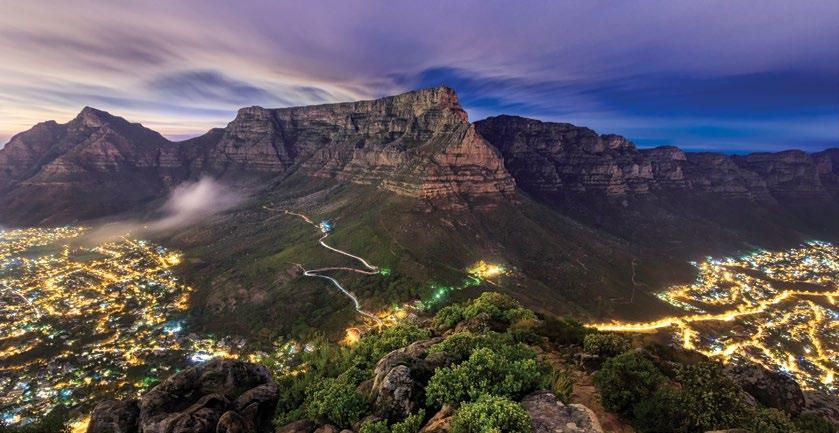
To ensure that face-to-face interactions remain a platform where deals are struck, relationships are formed, and ideas are generated, we recently launched “The Western Cape Business Events Support Programme” – an initiative designed to stimulate short and medium term recovery in the local business events sector of the Western Cape.

With a focus on small and medium sized in-person business events – the types of events eligible for support include national association conferences, B2B exhibitions, workshops, seminars, as well as corporate meetings and incentive groups.
• The project objective is to provide support to local Business Event organizers who are planning a Business Event in the Western Cape up and until 31 March 2022.
The Cape Town & Western Cape Convention Bureau will consider supporting business events that meet the following criteria:
• a minimum of 20 in-person delegates (small event); a minimum of 50 in-person delegates (medium event)
• a minimum duration of two days and one night stay for a minimum of 50% of your projected delegates numbers; and
• must be hosted prior to 31 March 2022.
Please indicate/ include the following in your application:

• Your event shoulder a weekend (start on Monday or end on a Friday)
• Proof of venue hire and/or accommodation enquiry/reservation from the venue/accommodation establishment must be presented with the application.
• The event organiser is in good standing (i.e. valid tax clearance and BEE certification) and registered on the Central Supplier Database. For more information and the application form, please visit https://www.wesgro.co.za/convention-bureau/why-meet-in-cape-town/ business-events-support-fund.
































































































































































